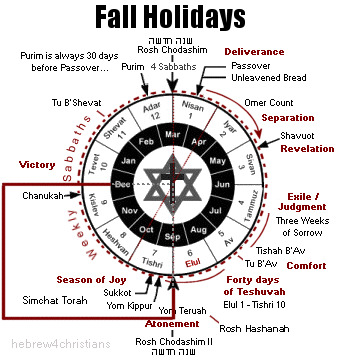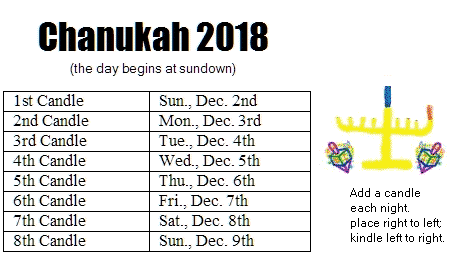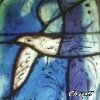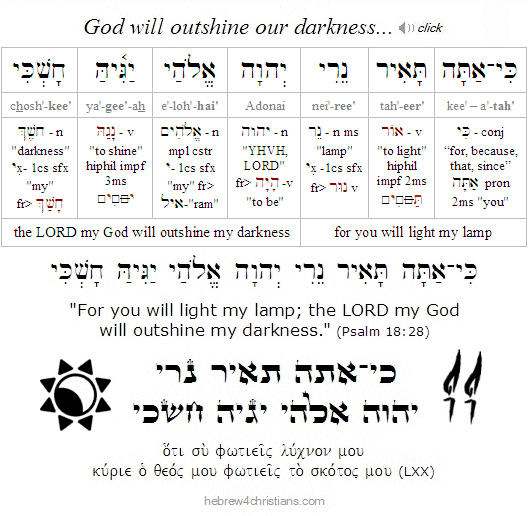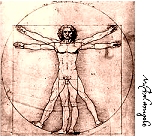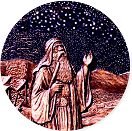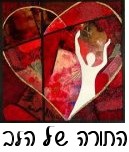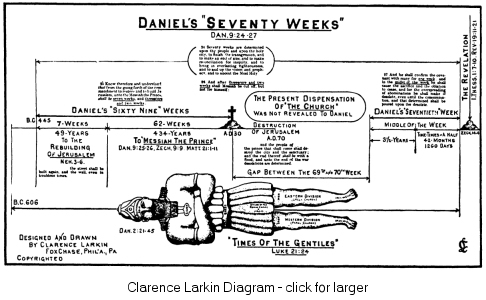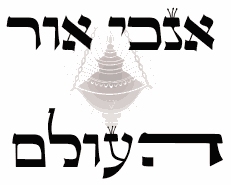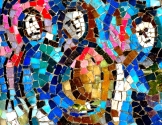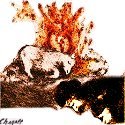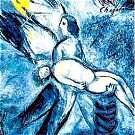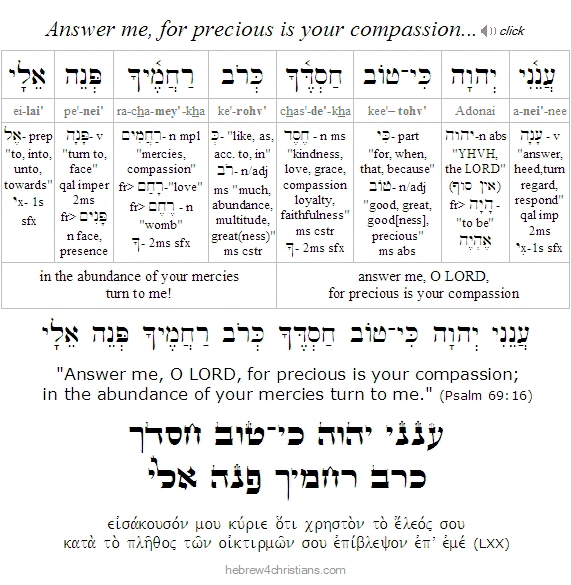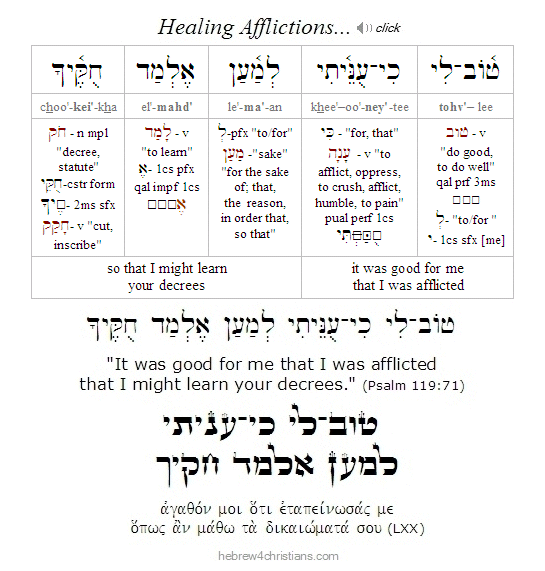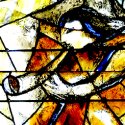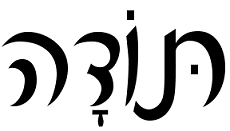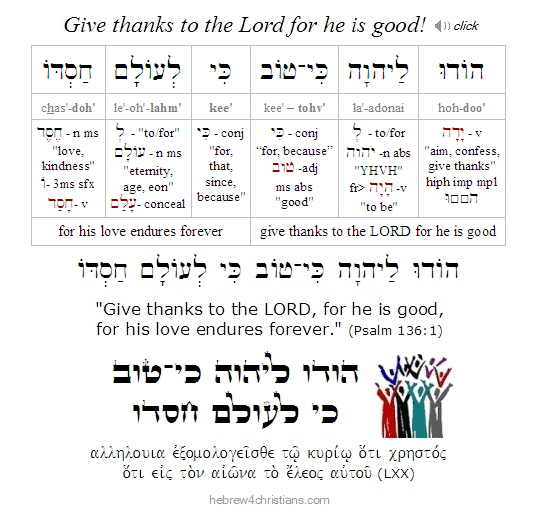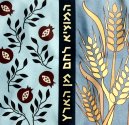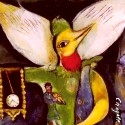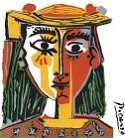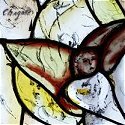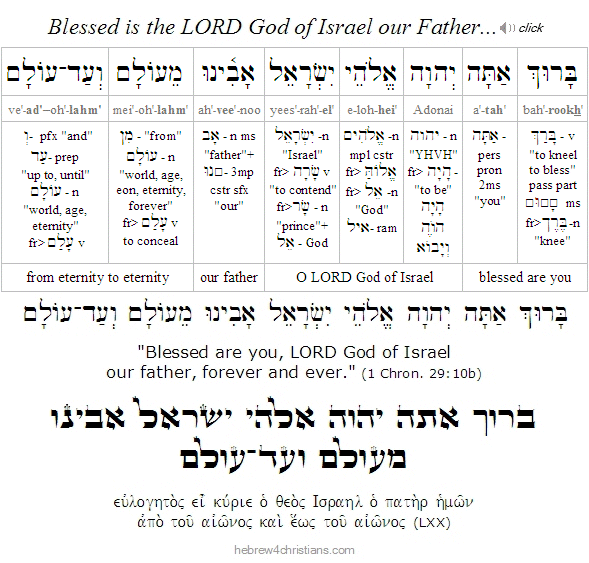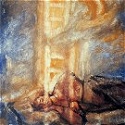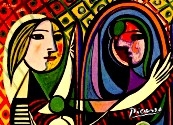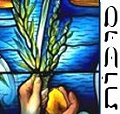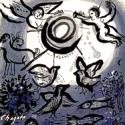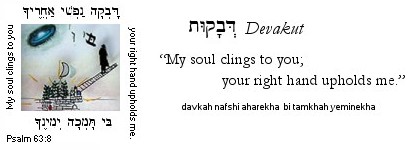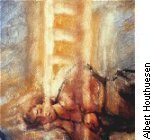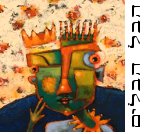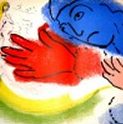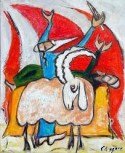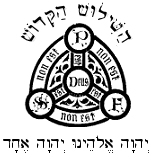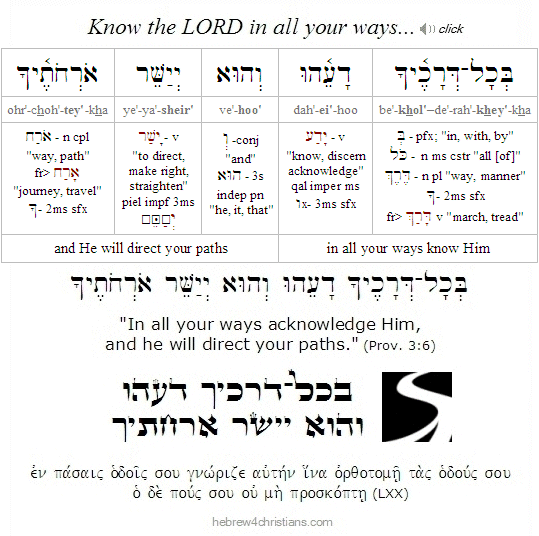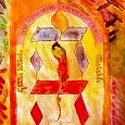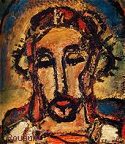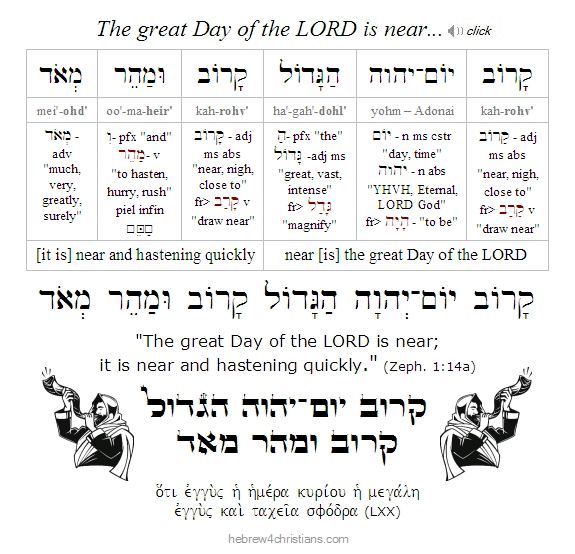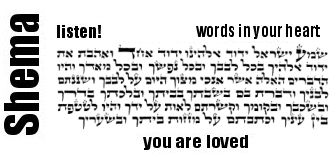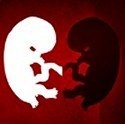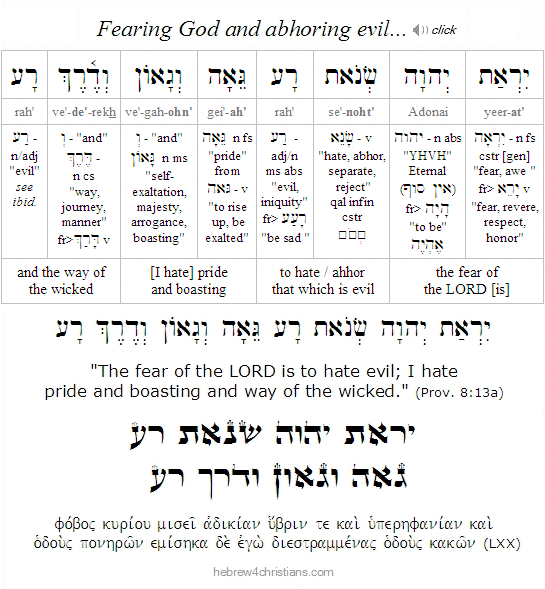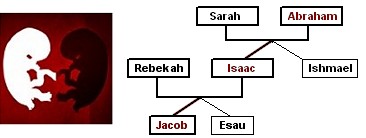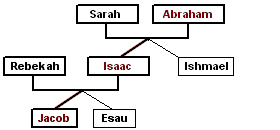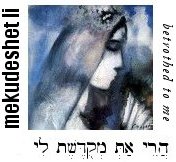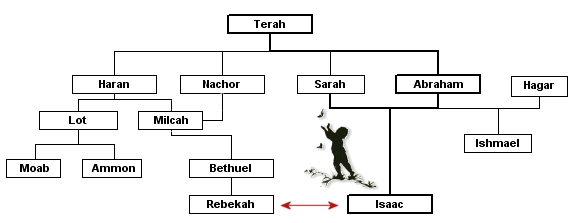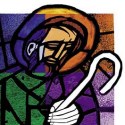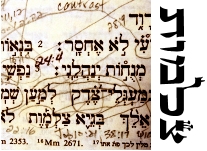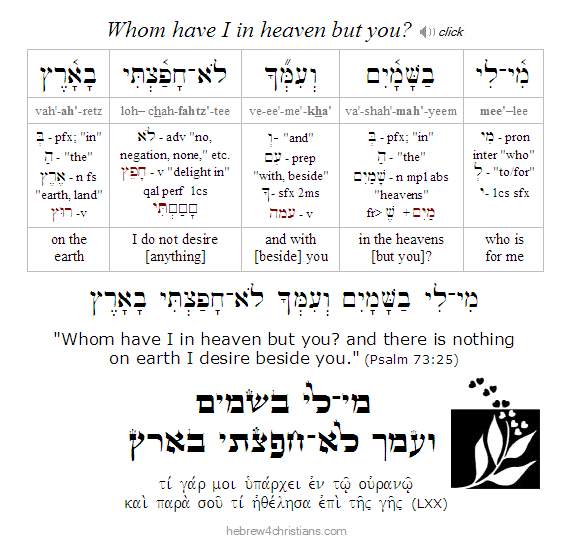|
|
|||||||||||||||||||||
 |
|||||||||||||||||||||
|
Learn Hebrew |
|||||||||||||||||||||
 |
|||||||||||||||||||||
|
Jewish Holiday Calendar For November 2018 site updates, please scroll past this entry....
The fall festivals prophetically indicate the Day of the LORD, the second coming of Yeshua, the great national turning of the Jewish people, and the establishment of the reign of the Messiah upon the earth during the Millennial Kingdom in the world to come.
Note: For more about the dates of these holidays see the Calendar pages....
11.30.18 (Kislev 22, 5779) Fear (and it's offspring, anger) create a place of painful exile within the heart. As we consciously focus on the LORD and spiritual reality, there is no fear, since God's light and love overcome all our darkness (John 1:5; 1 John 4:18; 5:3). The Spirit of God calls out: "Fear not, for I have redeemed you; I have called you by name, and you are mine" (Isa. 43:1). God has personally redeemed you, friend; He calls you by name, and you belong to Him. The Lord loves you with an everlasting love and draws you close (Jer. 31:3). He will never leave nor forsake you, even if you might face waters that seem to overwhelm or fires that seem to devour (Isa. 43:2). The LORD will keep you in "perfect peace" - the "peace of Peace" (שָׁלוֹם שָׁלוֹם), when you set your mind on Him (Isa. 26:3). This is not peace the world offers you, friend, but a supernatural act of deliverance from anxiety and fear... יֵצֶר סָמוּךְ תִּצּר שָׁלוֹם שָׁלוֹם כִּי בְךָ בָּטוּחַ ye·tzer · sa·mukh · titz·tzor · sha·lom · sha·lom · ki · ve·kha · ba·tu·ach You will keep him in perfect peace whose mind is stayed on you, for he trusts in you. When we forget that God is in complete control of all things, we tend to grow anxious... Feeling worried comes from focusing on ourselves, a perspective that can make us feel alone, forgotten, and even victimized in this world. Worry moves us to defend ourselves, to seek refuge in our own devices, and to forfeit the will of God according to the dictates of lesser fears... The sages say it is not permitted to worry: "To worry is a sin; only one sort of worry is permissible; to worry because one worries." We should worry that we worry because this indicates our hardness of heart and our unbelief! God's name YHVH (יהוה) means "Presence," "Breath," "Life," and "Love." So why be anxious for "tomorrow"? We really only have this moment, but this moment is entirely sufficient when we walk in the light of God and seek to know him in all our ways. "Let the peace of God rule in you" (Col. 3:15).
11.30.18 (Kislev 22, 5779) The only way out of the painful ambiguity of life is to hear a message from the higher world, the Heavenly Voice, that brings hope to our aching and troubled hearts: "Faith comes by hearing the word of Messiah - ῥῆμα Χριστοῦ" (Rom. 10:17). And yet what is the meaning of this message if it is not that all shall be made well by heaven's hand? There is hope, there is hope, and all your fears will one day be cast into outer darkness, swallowed up by God's unending comfort... "Go into all the world and make students (תַּלְמִידִים) of all nations" (Matt 28:19), and that means sharing the hope that what makes us sick - our depravity and despair - has been healed by Yeshua, and that we escape the gravity of our own fallenness if we accept his invitation to receive life in him. "For it is you who light my lamp; the LORD my God will outshine my darkness." כי־אתה תאיר נרי kee -a·tah · tah·eer · nei·ree "For it is you who light my lamp; Exercising faith means actively listening to the Eternal Voice, the Word of the LORD that calls out in love in search of your heart's trust... To have faith means justifying God's faith in you, that is, understanding that you are worthy of salvation, that you truly matter to God, and that the Voice calls out your name, too.... Living in faith means consciously accepting that you are accepted by God's love and grace. Trusting God means that you bear ambiguity, heartache, and darkness, yet you still allow hope to enlighten your way. "To have faith is to perceive the wonder that is here, and to be stirred by the desire to integrate the self into the holy order of being. Faith does not spring out of nothing. It comes with the discovery of the holy dimension of our existence. Faith means to hold small things great, to take light matters seriously, to distinguish between the common and the passing from the aspect of the lasting. It is from faith from which we draw the sweetness of life, the taste of the sacred, the joy of the imperishably dear. It is faith that offers us a share in eternity." - Abraham Heschel We walk by faith, not by sight - by hearing the Word of God, heeding what the Spirit of God is saying to the heart.... In light of the obscurity of life in this temporary age, we must not to lose heart, since though our outer self is wasting away, our inner self is being "raised into newness" (ἀνακαινόω) day by day (2 Cor. 4:16). "For our light and transient troubles are achieving for us an everlasting glory whose weight is beyond description, because we are not looking at what can be seen but at what cannot be seen. For what can be seen is temporary, but what cannot be seen is eternal" (2 Cor. 4:17).
Note: Happy Chanukah, friends. Please pray for this ministry... Things have been difficult for me lately, so please ask our Lord for his favor and grace for this work to continue. Shabbat shalom! 11.29.18 (Kislev 21, 5779) The holiday of Chanukah reminds us that we must remain committed to Torah truth in a godless, and therefore insane, world. After all, since reality is the "handiwork" (i.e., conscious design) of an all-powerful, all-knowing, all-loving, morally perfect, purposive, personal, and spiritual Agency who has been revealed in the Jewish Scriptures, those who deny this reality are living in a state of ongoing delusion. In a sense, the history of humanity - especially as it has been expressed philosophically and politically -- has been nothing less than the conscious design to redefine reality as something that it isn't. "The kings of the earth station themselves, and the dignitaries take counsel together against the LORD and His Messiah" (Psalm 2:1-3). Spiritual warfare is therefore the fight for sanity and truth in a world that prefers madness and self-deception.
11.29.18 (Kislev 21, 5779) I recently read an article that stated that between "6,000 and 10,000 churches in the U.S. are dying each year," which implies that well over 100 churches will die this week alone! In this connection note that the Scriptures state that there will be a great falling away or "apostasy" (i.e., ἀποστασία, from ἀπό, "away" + ἵστημι, "standing") leading up to the prophesied "End of Days" (2 Thess. 2:3; 1 Tim. 4:1; 2 Tim. 3:1-5; 2 Pet. 3:3). People will turn away from the truth of God and immerse themselves in delusions of various kinds; they will become increasingly narcissistic, self-absorbed, and numb to moral reality (Matt. 24:12). But note the prophetic order: first comes the great apostasy leading up to the period of Great Tribulation, and then God's catastrophic judgment will fall upon the world system. This coming "judgment day" is called the "great Day of the LORD (i.e., yom Adonai ha'gadol: יוֹם־יהוה הַגָּדוֹל) in the Hebrew Scriptures. The judgment of Pharaoh of old prefigures the coming worldwide judgment upon the "Messiah of Evil" to come... Note: I think the attrition of churches today may indicate a major shift in social interactions within our current postmodern culture where the "iPhone" has become the preferred mode of communication between others... "Brick and mortar" churches are going the way of "brick and mortar" stores on Main Street America... Also the years of relentless propaganda and disinformation promoted by the government, through mass media, pop culture, public schools, and pseudo science has begun to yield its harvest in the mass hypnosis and cognitive dissonance of culture. Add to that the ignorance found in many denominational forms of Christianity, the liberalism and apostasy of many "rainbow" churches," the dogma of many religious institutions such as the RCC (among many others) that continue the error of replacement theology, and so on -- all this has created a migration to more home-based or alternative types of "church" experiences. Add to the mix the rise of various cults, the prevalence of new age paganism (such as Wicca, kabbalah, witchcraft, etc.), and the pernicious social activism based in postmodern philosophy, and there you have it.
11.28.18 (Kislev 20, 5779) "We groan inwardly as we eagerly await our redemption..." (Rom. 8:23). We sigh deeply because we are suspended between two worlds, living in the ambiguity of an already-not-yet expectation, enduring ourselves as imperfect vessels longing for perfection, trapped between what is and what will be, seeing the unseen, yearning for healing, believing that we shall never die, even as we die (John 11:26). We are restless for our eternal home and long for God's presence as we walk through shadowy vales, facing various temptations, whispering our prayers in the dark. And though we must learn endurance and trust in God's sovereign purposes, our faith nevertheless compels us to cry out, "How long, O Lord?" and "Come, Lord Yeshua" (Rev. 22:20). Our ongoing challenge is to keep a positive attitude despite the struggles we face, and therefore we inwardly pray: "Renew within me ruach nachon (רוּחַ נָכוֹן) - "a spirit that says Yes" (Psalm 51:10). Surrender means accepting God's will for our lives -- saying "yes" to the promise of love, even if we presently feel empty inside and wonder how long we can hang in there... Saying "yes" implies saying "no" to other things - no to fear, anger and doubt, for example. Tragically there are people who have given up hope for bitterness and despair. Asking God to give us a spirit of "yes" is really a prayer for focus, direction, and the willingness to keep pressing on to our heavenly destiny. Though life is a struggle, we do not lose heart or faint, since even if the outer self is wasting away, our inner self is being renewed day by day. "For this light momentary affliction is preparing for us an eternal weight of glory beyond all comparison, as we look not to the things that are seen but to the things that are unseen. For the things that are seen are transient, but the things that are unseen are eternal. For we know that if the tent that is our earthly home is destroyed, we have a building from God, a house not made with hands, eternal in the heavens. For in this tent we groan, longing to put on our heavenly dwelling, that is, substance and reality..." (2 Cor. 4:16-5:3).
11.28.18 (Kislev 20, 5779) It is written in our Scriptures: "As a man thinks in his heart, so is he." We often see what we want to see more than what is really there. That's called wishful thinking. We overlook much, and we often ignore what might challenge our own preferred interpretations. For example, we may think that we are trusting God for our lives, but we worry, we attempt to control others, we get angry, and so on. We have a blind spot regarding the question whether we really trust God, perhaps because seriously investigating what we really believe seems too threatening (John 16:31-32). After all, what if we don't really know what to believe? What if we struggle to believe? What if we are confused? What does that say about who we are? So we ignore the real problem (namely, our lack of truth and our little faith in God) and continue to think we are something we are not. We fool ourselves and trade a sense of "satisfaction" at the expense of truth. This is a common failing of human nature. During the Nazi years, many ordinary Germans refused to investigate reports of atrocities at the death camps because it was too costly to discover the truth (the same might be said about any patriotic citizens who rationalize the actions of their government regardless of the moral issues involved). By willfully hiding from the facts, we pretend we are not responsible, and therefore we justify passivity in the face of injustice and evil. הֵן־אֱמֶת חָפַצְתָּ בַטֻּחוֹת hein-e·met · chah·fatz·tah · va·too·choht "Behold, you delight in truth in the inward being, Often, however, the truth "of the inward being" must come at the expense of heartache, for surely the heart must ache, tremble, and despair before it comes to accept the truth about its condition. This sort of truth is "existential," meaning that it is known only through the process of living life itself. As Kierkegaard said, "There are many people who reach their conclusions about life like schoolboys: they cheat their master by copying the answer out of a book without having worked the sum out for themselves." Yes, and they cheat themselves, too, since they somehow believe that "knowing the answer" given by another is the same thing as "knowing the answer" of their own inward being... Kierkegaard continues this thought: "The truth is lived before it is understood. It must be fought for, tested, and appropriated. Truth is the way... you must be tried, do battle, and suffer if you are to acquire truth for yourself. It is a sheer illusion to think that in relation to truth there is an abridgment, a short cut that dispenses with the necessity of struggling for it." A man who was afflicted with a terrible disease complained to Rabbi Israel that his suffering interfered with his learning and praying. The rabbi put his hand on his shoulder and said, "How do you know, friend, what is more pleasing to God - your studying or your suffering?" (Buber: Hasidim).
11.28.18 (Kislev 20, 5779) A man came to a Torah teacher and said, "I don't know what to do. I study Torah, I pray, I give tzedakah, and yet I am in great sadness." The teacher said to him, "Never despise anyone, never condemn anyone, never speak evil of anyone - including yourself, and the Lord will fill you with shalom, healing peace." Amen, that is worthy counsel. Just as it's impossible for a man to see his face in troubled water, so too the soul -- unless freed from negative thoughts -- cannot find joy in the Spirit. Indeed the Scriptures say: "As a person thinks in his heart, so is he" (Prov. 23:7). Consider then how your thinking defines your inner reality and affects the quality of your spiritual life. Thinking is inextricably linked to faith, and therefore we are responsible not only for what we believe, but for how we think (Acts 17:30-31). Sinful thinking creates "negative energy" that brings pain to yourself and others. Left unchallenged, such darkened cognitive function leads to slavery of the mind, hopeless addictions of thought, and distressing captivity. The first step to freedom is to acknowledge the reality of our own habitual negativity – and to bring that truth to the light. Understand that teshuvah – turning to God – yields the soul before the love of God for rectification: "If we confess our sins, he is faithful and just to forgive us our sins and to cleanse us from all unrighteousness" (1 John 1:9). We are to take "every thought captive" and that means repudiating the power and effect of the lie. If we are blind to our own sin, we cannot confess the truth to find lasting healing (James 5:16).
11.27.18 (Kislev 19, 5779) Some of us need to learn that we don't always know the answer, and that often enough we don't even know the meaning of the question being asked... An old story comes to mind in this regard. One day some Torah students came to visit a famous Torah sage who decided to test them. He raised various questions about the Scriptures, and he began from the youngest to ask the meaning of this or that text. Each replied as best he could, but the teacher said, "You have not got it yet..." Finally he asked an older man who had kept quiet throughout the discussion. "What about you? What do you say this text means? The older man replied, "I do not know..." Then the teacher said, "Truly this one knows the way, since he says that he does not know." The moral of the story is that by accepting our limitations we are enabled to ask God for help in our walk by faith. We see through a glass "darkly" (ἐν αἰνίγματι). "The Spirit helps us in our weaknesses. For we do not know (οὐκ οἴδαμεν) what to pray for as we ought, but the Spirit intercedes for us with groanings too deep for words" (Rom. 8:26). We groan in hope... It is a blessedness to be free from the need to feel like we always have to be "right," to manage appearances, and so on. God opposes the proud, but his Spirit (רוּחַ) rests upon the lowly, the humble of heart. Therefore humility (i.e., anavah: עֲנָוָה) is considered one of the greatest of middot ha-lev (heart qualities). As it is written, the high and lifted up One dwells with the broken and lowly of spirit, to revive the spirit of the lowly and to revive the heart of the crushed (Isa. 57:15).
11.27.18 (Kislev 19, 5779) "Whoever has my commandments and keeps them, such is the one who loves me. And the one who loves me will be loved by my Father, and I will love him and will manifest myself to him" (John 14:21). Note that the Greek word translated "manifest" means to "shine inside" (i.e., ἐμφανίζω, from ἐν, "in" and φαίνω, "shine"), indicating that the revelation would be inward light of the Presence of Messiah himself (Χριστὸς ἐν ὑμῖν, ἡ ἐλπὶς τῆς δόξης, Col. 1:27). As you receive God's love, as you embrace it as your own, the love of Messiah will become inwardly visible to you. This comes from a place of surrender and acceptance. As the late Paul Tillich said, "Sometimes in a moment of weakness light breaks into darkness, and it is as though a voice says, 'You are accepted; you are accepted... Do not seek for anything; do not perform anything; do not intend anything. Simply accept the fact that you are accepted.' If that happens to you, then you experience grace, and everything will be transformed." Ultimately Chanukah is about salvation and transformation - beauty from ashes - through the love of God...
11.27.18 (Kislev 19, 5779) Our Heavenly Father sees in secret... "The deepest thing in our nature is this region of heart in which we dwell alone with our willingnesses and our unwillingnesses, our faiths and our fears" (William James). It is there, in the secret place of the heart, that the sound of the "knock" is either heard or disregarded (Rev 3:20). May the Lord give us the willingness to do His will and the courage to believe in His love. And may God deliver us from doubt and from every other fear. May we all be strong in faith, not staggering over the promises, but giving glory to God for the miracle of Yeshua our LORD. May we all be rooted and grounded in love so that we are empowered to apprehend the very "breadth and length and height and depth" of the love of God given to us in Messiah, so that we shall all be filled with all the fullness of God (Eph. 3:14-19). Amen. [ The eight-day Festival of Chanukah begins at sundown on Sunday, Dec. 2nd this year... ]
11.26.18 (Kislev 18, 5779) More chapters of the Torah are devoted to the life of Joseph than to the account of creation, the story of Adam and Eve, the flood of Noah, the call of Abram to the promised land, the miraculous birth and (near) sacrifice of Isaac, the transformation of Jacob into Israel, and so on. Perhaps Joseph is given such prominence in Scripture because his life depicted both the Suffering Servant (Yeshua's first advent) and the One who reigns at the right hand of the power on high and delivers Israel (Yeshua's second advent). The life of Joseph provides a "prophetic outline" of Yeshua the Lord, the One who is both Mashiach ben Yosef (מָשִׁיחַ בֶּן־יוֹסֵף), "the Messiah son of Joseph," as well as Mashiach ben David (מָשִׁיחַ בֶּן־דָוִד), "the Messiah the Son of David."
11.26.18 (Kislev 18, 5779) Chanukah isn't "Jewish Christmas," friends, though if Yeshua was born during the time of Sukkot (i.e., Tabernacles), he would have been conceived around the time of Chanukah... At any rate, some people may question whether followers of Messiah should celebrate Chanukah or whether they should reject it because it is associated with Jewish nationalism (and later rabbinical tradition). Well, first it's important to remember that had God not given the victory to the Maccabees, then the Temple would have been razed and Jewish identity would have been lost. Worse yet, Jewish assimilation into Greek culture might have jeopardized the coming of the Messiah Himself. Moreover Chanukah is a prophetic holiday: Just as Daniel prophesied about how the Messiah Himself would be "cut off" for the transgression of God's people (Dan. 9:24-27), so he foresaw the ultimate doom of the Antichrist by the hand of the Messiah himself (Dan. 8:23-25). Indeed Yeshua taught that the "little horn" (i.e., Antiochus) prefigured the greater "Abomination that makes Desolation" to come (Matt. 24:15-22, Mark 13:14; cp. Dan. 9:27, 11:31;12:11). Yeshua was of course speaking centuries after Antiochus set up an altar to Zeus and offered a pig in the Temple, and therefore it is clear that He was prophesying of a future "abomination that makes desolation" that would occur later in Jewish history (2 Thess. 2:3-4). Further note that the though the word "Chanukah" is not mentioned in the Tanakh, it is mentioned in the New Testament (John 10:22-ff) where Yeshua testified that he was the promised Messiah.
[ The eight day holiday of Chanukah begins at sundown, Sunday December 2nd this year... ]
The intertestamental Book of Maccabees (c. 2nd Century BC) tell us more about this "little horn" and his vicious oppression of the Jewish people. Antiochus installed Hellenistic Jews to the priesthood and demanded the adherence to Hellenistic cultural ideals. He established edicts that prohibited observing the weekly Sabbath and the other biblical festivals. The reading of the Torah was outlawed and all copies of it were ordered to be burned. Temple sacrifices were forbidden; circumcision was outlawed and the penalty for disobedience was death. Women who disobeyed the edict by circumcising their sons were paraded about the city with their babies hanging at their breasts and then thrown down from the top of the city wall (2 Macc. 6:1-11). Many Jews fled and hid in the wilderness and caves and many died kiddush HaShem - as martyrs (see Heb. 11:36-39). Eventually Jewish resistance to this imposed Hellenization meant war. In 164 BC, in Modin, a small town about 17 miles from Jerusalem, Mattityahu (Matthias), a Hasmonean priest, and his five sons took refuge. When Antiochus' soldiers arrived at Modim to erect an altar to Zeus and force the sacrifice of a pig, Mattityahu and his sons rose up and killed the Syrians. They then fled to the Judean wilderness and were joined by other freedom fighters. After some organizing, they soon engaged in successful guerrilla warfare against their Syrian/Greek oppressors. The three-year campaign culminated in the cleansing and rededication of the Temple (for more on this subject, see Chanukah and Spiritual Warfare). 11.25.18 (Kislev 17, 5779) In our Torah portion for this week (i.e., parashat Vayeshev), we read how Joseph's jealous brothers stripped him of his "coat of many colors" and threw him into a pit -- a providential event that eventually led to the deliverance of the Jewish people by the hand of a "disguised savior." Indeed, the life of Israel's chosen son Joseph foreshadowed the two advents of Yeshua our Messiah: first as Israel's Suffering Servant (Mashich ben Yosef) and second as the national deliverer of the Jewish people during tribulation (Mashiach ben David).
[ The following entry is related to this week's Torah reading, parashat Vayishlach... ] וְיָדַעְתָּ כִּי־יְהוָה אֱלהֶיךָ הוּא הָאֱלהִים va·ya·da·ta · ki · Adonai · e·lo·he·kha · hu · ha·e·lo·him "Know therefore that the LORD your God is God, Recall that Jacob testified to his brother Esau: "God has dealt graciously with me, and I have enough" (Gen. 33:11), literally, "I have everything" (יֶשׁ־לִי־כל). However even after Jacob was renamed "Israel" by the Angel, the Torah still often calls him "Jacob," which suggests that our spiritual transformation is often three steps forward, two steps back... [ The following entry is related to this week's Torah reading, parashat Vayishlach... ]
[ The following entry is related to this week's Torah reading, parashat Vayishlach... ] קָטנְתִּי מִכּל הַחֲסָדִים וּמִכָּל־הָאֱמֶת ke·ton·ti · mi·kol · ha·cha·sa·dim · u·mi·kol · ha·e·met "I am not worthy of the least of all the deeds of love and faithfulness Yeshua told us we must "forget ourselves" in order to discover what really matters: "If anyone would come after me, let him deny himself and take up his cross and follow me. For whoever would save his life will lose it, but whoever loses his life for my sake will find it" (Matt. 16:24-25). Note that the phrase translated "deny himself" comes from a Greek verb (ἀπαρνέομαι) that means "to affirm that you have no acquaintance or connection with someone," and is the same verb used when Peter denied the Messiah (from α-, "not," + ῥέω, "to speak"). To deny yourself, then, means to be willing to disregard your own personal interests in a given moment -- to "betray" the selfish impulse that seeks to rule the ego in your daily life. It is a "putting off" of the old nature and a "putting on" of the new (Eph. 4:22-24). Put positively, denying yourself means "forgetting yourself" because you are overwhelmed with God's great love for your soul, and therefore you no longer "know yourself" according to the flesh but according to the Spirit of God (2 Cor. 5:16-17).
11.23.18 (Kislev 15, 5779) You may sometimes struggle with your faith -- not by questioning whether Yeshua is the Savior who died for your eternal healing, but in an hour of testing, when you feel exhausted by pain, when you pray for relief, seeking God in your cries and tears, but the pain continues, and then you are left rationalizing why you were denied your supplication, why your suffering has been prescribed -- for surely, you believe, God can heal you by simply saying the word - and then you wonder to what extent you need to be broken in order to be fully remade... As C.S. Lewis once said, "We are not necessarily doubting that God will do the best for us; we are wondering how painful the best will turn out to be" (Letters of C.S. Lewis, 1964). There is a trust issue in suffering, and an intimacy that comes through its fires. As Kierkegaard reminds us, "It is one thing to conquer in the hardship, to overcome the hardship as one overcomes an enemy, while continuing in the idea that the hardship is one's enemy; but it is more than conquering to believe that the hardship is one's friend, that it is not the opposition but the road, is not what obstructs but what develops, is not what disheartens but ennobles" (Four Upbuilding Discourses, 1844). עֲנֵנִי יְהוָה כִּי־טוֹב חַסְדֶּךָ a·nei·nee · Adonai · kee · tohv · chas·de·kha "Answer me, O LORD, for precious is your love; God sometimes allows difficulties in the lives of those whom He favors in order to ultimately reward them. Why were Sarah, Rebekah, and Rachel barren for so many years? So that God would hear their prayers and reward them for their steadfast faith. Why was Leah more fruitful than the other wives of Jacob? Because she was "hated" and subject to unending gossip that she tried to steal her sister's husband, yet she persevered in hope. In this connection, some of the Chassidic sages render Psalm 118:21 as, "I thank you that you have pained me (עֲנִיתָנִי) and have become my salvation." The pain that I regarded as punishment became the means by which I obtained the salvation of the LORD. Similarly, "It was good that I was afflicted (עֻנֵּיתִי), that I might learn your decrees" (Psalm 119:71).
"But You, O GOD my Lord, do Thou for me for your own Name's sake; because your steadfast love is good, deliver me" (Psalm 109:21). "Do thou for me" is the confession that God alone has the power to help. Asking God to bring glory to His own Name -- to honor and magnify His Name -- is the theme of all true intercession.
11.23.18 (Kislev 15, 5779) In our Torah portion for this week (i.e., parashat Vayishlach), we read how Jacob wrestled with a mysterious "Man" until the break of dawn, but refused to let go until he had secured God's blessing (Gen. 32:24-26). This climactic moment marked a "rebirth" experience for Jacob as signified by his new name "Israel" (יִשְׂרָאֵל), meaning "one who has striven (שָׂרָה) with God (אֱלהִים) and prevailed" (Gen. 32:28). It is fascinating to notice that Jacob was not renamed "God-fearer," or "God-lover," or even "Man of faith," but rather "God-wrestler" – one who struggles with God until the blessing comes... As Yeshua said, "Blessed are those who hunger and thirst for righteousness" – that is, for those who struggle and search for truth – "for they shall be filled" (Matt. 5:6). The blessing comes with a wound, however: The limp that Jacob acquired constantly reminded him of his ongoing need for God's help as he walked through this life. "The one who falls on this Stone will be broken to pieces; but when it falls on anyone, it will crush him" (Matt. 21:44).
11.22.18 (Kislev 14, 5779) The "silver rule" of Torah may be stated as, "Do not do to others as you would not have them do to you," (i.e., "do no harm"), whereas the "golden rule" may be stated positively as, "Do to others as they would have done to them" (i.e., "do the good"). Both principles are based on the concept of reciprocity: How you treat others affects who you are, and vice-versa, and therefore we see the centrality of respecting ourselves, of regarding ourselves as redeemable, lovable, and so on. "You shall not wrong or oppress a stranger, for you were strangers in the land of Egypt" (Exod. 22:20), and this includes the stranger you make of yourself; the parts of yourself you hide away from consciousness. Moral reality is grounded in empathy, or the exercise of sympathetic imagination... "Give and it shall be given back to you." Put yourself in the place of the other - the stranger, the outsider, the lost child - and remember the pain you experienced when you were an outsider, isolated and excluded... As we recognize the value, dignity, and worth of others, so we will find it within our own hearts, and this enables us to see more of the good. The measure you use will be measured back to you (Luke 6:38).
11.22.18 (Kislev 14, 5779) Expressing gratitude is a core value of genuine spirituality. "Modei ani," I thank you, God... Being thankful indicates that you are trusting that God is working all things together for your good, and it confesses that all you are is a gift from heaven. Indeed, the Hebrew word todah (תּוֹדָה), usually translated "thanks," can mean both "confession" and "praise." The matriarch Leah used a play on words regarding the birth of her fourth son (Gen. 29:35) when she said she would thank the LORD (אוֹדֶה אֶת־יהוה), and therefore she named him "Judah" (יְהוּדָה), from which the word "Jew" was later derived. The Apostle Paul, the greatest of the Torah sages, alluded to this when he said that a true Jew (יְהוּדִי) is one inwardly (κρυπτός), whose circumcision is a matter of spirit, not of the flesh. A genuine Jew gives thanks to God for who He is and what He has done; his desire is not for the approval of men, but of God (Rom. 2:28-29). הוֹדוּ לַיהוָה כִּי־טוֹב hoh·doo · la·do·nai · kee · tohv · kee · le·o·lahm · chas·doh "Give thanks to the LORD, for he is good, I am thankful to the Lord for the opportunity to have served you here at Hebrew for Christians over the years, and I am also grateful for your kindness and encouragement, friends. Chag Hodayah Sameach! (חג ההודיה שמח) - Happy Thanksgiving, chaverim! - John
11.22.18 (Kislev 14, 5779) You may sometimes feel like no one really cares for you, that no one loves you without conditions, and that you are therefore abandoned to wander about lost in your pain, without a sense of acceptance or "place" for your life... You may sometimes feel like you are in exile, estranged from others, in a place of desperation, a silent scream, without a real friend in the world. These are real feelings and I do not discount them, though often such feelings arise from unbelief, or at least from questioning whether God's love is for you, after all. Yet there is comfort for your mourning; there is consolation for the grief and emptiness you feel inside. Look again to the cross and attend to God's passion for you; believe in the miracle of Yeshua's love for you; by faith see his blood shed for you... He knows your alienation: he was "despised and rejected of men"; he knows the pains of your heart: he was a "man of sorrows acquainted with grief"; he knows the heartache of being forsaken, abandoned, and utterly betrayed. Indeed Yeshua knows your infirmities; he understands how you hurt and calls you to his comfort... Therefore when feelings of loneliness well up within you, go inward to commune with the Spirit. Ask God for his consolation so that you too might console others who are suffering (2 Cor. 1:3-4). Do not lose hope but foresee your blessed future. Focus on the coming day of healing for all the world. Remind yourself again and again that you are never really alone, that nothing can separate you from God's love, and that God's Name is "I-am-with-you-always," "I am your Abba, your Imma, your true home and place of belonging, all your dreams of love will come true, and unimaginable beauty and endless delight await you in the glories of the world to come." "Whoever has God truly has a companion in all places, both on the street and among people.. Why is this so? It is because such people posses God alone, keeping their gaze fixed upon him, and thus all things reveal God for them.... Such people bear God in all their deeds and in the places they go, and it is God alone who is the author of all they do." - Meister Eckhart (Talks of Instruction)
11.21.18 (Kislev 13, 5779) Worry is a place of exile and pain. "For thus said the Lord GOD, the Holy One of Israel, "In returning and rest you shall be saved; in quietness and in trust shall be your strength" (Isa. 30:15). This message, alas, is rarely heeded because people are easily seduced by the vain attractions and empty threats of this evil world. We are constantly barraged with spurious messages that appeal to our lusts, our fears, or our vanity: "Buy me!" "You need this!" "Find pleasure," "This will bring you love, respect," etc.; Or we are given subliminal messages to be afraid and conform to the programming of those in power, to uncritically trust authority figures, to resist independent thinking, to submit to the mass hypnosis of the collective, and so on. We are so saturated by such fraudulent messages that we often deprecate them as "just words" and thereby become cynical of our need for truth. Because worldly language is a means of coercion and violence, we must be ready to think clearly and to ask the deeper questions about truth, significance, and the reality that language was intended to reveal to our conscious minds. Just as written words require surrounding spaces to identify their significance, however, so we need quiet - silence spaces within our souls - to heed the message of truth. Indeed the Torah links the use of language with the soul (i.e., nefesh: נֶפֶשׁ) since God breathed into Adam the ability to think and to speak. Thought and speech, then, are two primary characteristics of being created in the image (צֶלֶם) of God. A declarative statement constitutes an implied promise of veracity or"testimony" that is considered a "bond on the soul" (אִסָּר עַל־נַפְשׁוֹ) and therefore our use of words is directly linked to the "breath of God" within us. This further implies that lying, equivocating, denying the truth, or breaking our word defaces the image of God within us. יִהְיוּ לְרָצוֹן אִמְרֵי־פִי yi·he·yu · le·ra·tzon · im·rei · fi Let the words of my mouth and the meditation of my heart
[ Happy Thanksgiving, friends. It is always good to thank God for the precious gift of life... ] אַתָּה קָדוֹשׁ ve·a·tah · ka·dohsh · yo·sheiv · te·hee·lot · yees·ra·eil "You are holy,
11.21.18 (Kislev 13, 5779) Those who deny that objective truth exists (or those who deny that something may be known about reality) are themselves making a truth claim, namely the claim that there is no such thing as objective truth (or that knowledge of the world is not possible). This self-stultifying incoherence is a sign of profound despair and irrationalism, of course, the abandonment of reason, which perhaps is the ulterior motive for such manner of thinking, after all. The person who denies truth does so to escape the demands of truth – to flee from personal responsibility before moral and spiritual Reality. It is a form of self-deceptive "wish-fulfillment" to say that people are not responsible for what they believe and how they live their lives. Hence our culture's obsessive "busyness," its craving for ongoing diversion, entertainment, fantasy, escapism, and so on. Our generation finds evil in "boredom" and finds nothing of lasting interest because it has forsaken the big questions of life and the pursuit of truth. Popular culture encourages apathy, indifference, and seeks to enslave people to thrills and titillations of the moment... The ancient pagan world at least esteemed honor and believed in the pursuit of virtue and truth, but today's post-Christian world is nihilistic, anarchist, and therefore marks a return to barbarism.
11.21.18 (Kislev 13, 5779) It's been said that God sends each soul into the world with a special message to deliver, a revelation that only he or she can disclose... No one else can bring your message to this world - only you can do this. And since God is entirely unique, you are called to be who you were created to be, not someone else. However in order to "deliver" the message of your life you must be free from the delusions of the "false self," and that requires the decision to be honest with yourself. Socrates' famous dictum that "the unexamined life is not worth living" means that we are willing to undergo self-examination (i.e., cheshbon ha'nefesh: חֶשְׁבּוֹן הַנֶּפֶשׁ), even if by doing so we discover our untruth, our disordered loves, our selfishness and sickness of heart. This the basis of confession of sin and healing... We must "own" who we are, take responsibility, and go "through the wound" to find freedom. There is no shortcut here; no half-measures. No one else can do this for you. Rabbi Zusya said, "In the world to come they will not ask me, 'Why were you not like Moses? They will ask me, 'Why were you not Zusya?" (Buber: Hassidim). As we ask searching questions about our heart motivations and ask God for wisdom, we move toward humility and discard our "need" for perfection. We can then accept ourselves for who we really are, namely, broken people in need of God's kindness and love. Someone might say, 'Socrates, can you not go away from us and live quietly, without talking?' Now this is the hardest thing to make some of you believe. For if I say that such conduct would be disobedience to God and therefore I cannot keep quiet, you will think I am jesting and will not believe me; and if again I say that to talk every day about virtue (ἀρετῆς) and the other things about which you hear me talking and examining myself and others is the greatest good to man, and that the unexamined life is not worth living (ὁ δὲ ἀνεξέταστος βίος οὐ βιωτὸς ἀνθρώπῳ), you will believe me still less. This is as I say, gentlemen, but it is not easy to convince you." (Apology)
11.20.18 (Kislev 12, 5779) "I determined not to know any thing ... apart from Yeshua the Messiah and him crucified" (1 Cor. 2:2). This mode of "not knowing apart" bespeaks a radical intimacy that mediates and transforms all other thought within you. It is the axiom of spiritual existence, the matter of "first importance," the core of heart of everything: to know the healing love of Messiah and the power of his resurrection on your behalf (Phil. 3:10). When you accept the Divine Presence in Yeshua, everything becomes simple, unified, and focused. Choosing to know everything "through" Yeshua moves you to the center of reality - where the present moment is lit up with the glorious light of the eternal... You begin to see past the distractions of this world - "for God is not in the earth, wind or fire" (1 Ki. 19:11-12) - beyond the ups and downs of your life, the hunger and thirst of your heart, past all your fears, desires, and sorrows, to hear the "still small voice" (i.e., kol demamah dakkah: קוֹל דְּמָמָה דַקָּה), to enter an unimaginably wonderful peace, the place of God (i.e., ha'makom: הַמָּקוֹם) which is your true home, the habitation of our all-loving Father who calls you by name... 11.20.18 (Kislev 12, 5779) From our Torah portion this week (i.e., Vayishlach) we read: "And Jacob called the name of the place "the Face of God" (i.e., Peniel: פְּנִיאֵל) saying, "For I have seen God face to face (i.e., panim el-panim: פּנִים אֶל־פָּנִים), and yet my life has been delivered" (Gen. 32:30). And where did Jacob see God "face to face" except in the struggle of faith, while seeking the blessing, even in the midst of his own inner conflict? And here too may we find the Shining Presence, the Face of God, even in the midst of our troubled lives, as we struggle, refusing to let go until we are taken hold by God's love...
11.20.18 (Kislev 12, 5779) Though it is important to guard our convictions and to be passionate about what we believe regarding spiritual matters, we must nevertheless be careful to walk in humility before the mystery of life... After all, much is inscrutable to us, much is beyond our understanding, and therefore, if we are honest, we should be reverent before the "sacred secrecy" of everything. Fanaticism and intolerance (whether secular or religious) is motivated by willful ignorance of the marvelous complexities that pervade existence. The fanatic invariably seeks to reduce life to a simple formula, recipe, and a generalization. The humble person, on the other hand, freely confesses that they "walk by faith, not by sight" -- by hearing the Word of God and heeding what the Spirit of God is saying to the heart... For now we "see through a glass darkly," which literally means "in a riddle" (ἐν αἰνίγματι). A riddle is an analogy given through some resemblance to the truth, though quite often the correspondences are puzzling and obscure. Hence, "seeing through a glass darkly" means perceiving obscurely or imperfectly, looking "through" something else instead of directly apprehending reality. We see only a reflection of reality, and our knowledge in this life is indirect and imperfect. This is contrasted with the "face to face" (פָּנִים אֶל־פָּנִים) vision and clarity given in the world to come, when our knowledge will be clear and distinct, and the truth of God will be fully manifest and no longer hidden. Being "face to face" with reality means being free of the riddles, the analogies, the semblances, etc., which at best adumbrate our way.. Such reflection should make us humble whenever we share our faith. "Now we know in part, but then shall we know in whole" (1 Cor. 13:12). Let therefore repeat that an honest theology must find a place for mystery, for "seeing through a glass darkly," and for the apprehension of awe and wonder. "A genuine faith must recognize the fact that it is through a dark glass we see; though by faith we do penetrate sufficiently to the heart of the mystery so as not to be overwhelmed by it. A genuine faith resolves the mystery of life by the mystery of God. It recognizes that no aspect of life or existence explains itself, even after all known causes and consequences have been traced. All known existence points beyond itself. To realize that it points beyond itself to God is to assert that the mystery of life does not dissolve life into meaninglessness...." (Reinhold Niebuhr) Since the LORD God is called the Infinite One (אֵין סוֹף) whose understanding is without limit (Psalm 147:5), we must use analogies, metaphors, symbols, allusions, parables, poetry, and other linguistic devices (as well art and music) to convey spiritual truth and meaning. We compare (συγκρίνω) spiritual things with spiritual (1 Cor. 2:13). Some of the classical "mystics" have said the way to God is through the transcendence of words altogether, though most of them use imagery and poetry to speak about "ineffable" reality. Others, like Soren Kierkegaard, use "indirect communication" to evoke the decision to believe, to find hope, and to walk by faith. The truth can be found, not by means of humanistic learning, but by special revelation and encounter with the Truth of God. "Bring me a fruit from that tree." "Here it is, venerable sir." "Cut it open." "It is cut open, venerable sir." "What do you see in it?" "Very small seeds, venerable sir." "Cut one of them open." "It is cut open, venerable sir." "And what do you see in it?" "Nothing, venerable sir." Then he said, "That hidden thing which you cannot see, O gentle youth, from that hidden thing has this mighty tree grown" (Upanishad)
11.19.18 (Kislev 11, 5779) The ultimate question is whether you feel "safe" with the truth of who you really are... When you are all alone, in a moment of still silence, when the entire world is asleep and suspended, what is the message of your heart's cry? Are you okay? Do you trust who you are or what is happening to you, or do you experience anxiety, a sense of lostness, inner pain? Comfort is found in God's grace. His promise is given to the sick at heart, to those who understand their need for a physician (Matt. 9:12). Since there is nothing about you to commend before God, you are made free to abandon yourself to the divine love. This is the "Name of the LORD," after all, and your heart's cry for love is a "prayer" uttered in that Name. Your heavenly Father sees in secret (Matt. 6:6). Consider the birds of the air; they are unreflective, alive in the atmosphere of God's care. What a great blessing to let go of your fear; what sweet relief! Surrender to the truth of your helplessness; rejoice that you are "poor in spirit," and discover that yours is the Kingdom of Heaven (Matt. 5:3). So don't give up your faith, my friend. God promises to be with you to the end, leading you to the place where your heart will forever be satisfied in his love. On a day shortly before his death, the rav asked his grandson: "Do you see anything?" The boy looked at him in astonishment. Then the rav said: "All I can still see is the divine nothingness that gives life to the world." (Martin Buber: Tales of the Hasidim)
[ The following entry is related to this week's Torah reading, parashat Vayishlach... ]
[ We always read Vayishlach a couple weeks before Chanukah when we connect the vision and ministry of Joseph with that of Yeshua, the Suffering Servant Savior of the world... ]
The word vayishlach (וַיִּשְׁלַח) means "and he sent" (from shalach, שׁלח, "to send"). The sages comment that like Jacob, each person of faith is a shaliach (שָׁלִיחַ), or an "emissary" sent out to bear witness to others of the reality and true blessing of God. And may the LORD God of Israel help you, friend, serve as an extension (שְׁלוּחָה) of His loving and gracious Presence to all you may encounter this day.... L'shavuah tov b'Yeshua Adoneinu, chaverim...
11.16.18 (Kislev 8, 5779) Regarding Abraham it is written: "And he believed the LORD, and he counted it to him as righteousness" (Gen. 15:6). Here note the distinction between the promise of God and the commandments of God. The promise of God focuses on God's heart - his desire and goal, his character and passion - but the commandments of God focus on man's heart, in his desire and will to obey (or not). Receiving God's love is not based on imperative and the language of conditional acceptance, but is based on the invitation and promise of love and grace. The "work of faith" (מַעֲשֶׂה הָאֱמוּנָה) is to believe that God accepts you despite your unacceptability, and that you are esteemed righteous for believing the truth of God's heart. Faith justifies the ungodly because faith accepts the promise, just as Abraham was justified because he trusted in the promise of the seed to come. Therefore, as Rabbi Paul taught, we maintain that a person is justified apart from the law (Rom. 3:28), which is to affirm that eternal life is found exclusively in the grace and promises of God. This is the Torah of "faith, hope, and love," and it is a lifelong discipline to know it in the truth. "Blessed are those who hunger and thirst for God's righteousness, for they shall be satisfied" (Matt. 5:6).
11.16.18 (Kislev 8, 5779) "Blessed are you, O LORD God of Israel our Father, forever and ever. Yours, O LORD, is the greatness and the power and the beauty and the victory and the majesty, for all that is in the heaven and in the earth is yours. Yours is the kingdom, O LORD, and you are exalted as head above all" (1 Chron. 29:10-11). Amen, amen. In light of this blessed truth, then, what is it but unbelief that incites us to fear, to become anxious, frustrated, angry, and to seek to control outcomes? Forgive us, O Lord: We sometimes fail to remember your greatness; we lose sight that you indeed reign over all; our fears moves us into exile, our hearts grieve when we find ourselves immersed in the vanity of this world... But "all that is in heaven and earth is thine" (כּל בַּשָּׁמַיִם וּבָאָרֶץ לְךָ), and therefore everything is under your ongoing supervision... You sustain and uphold all things by the Word of your Power (נוֹשֵׂא כל בִּדְבַר גְּבוּרָתוֹ); you are our good Shepherd, our loving Father; you watch over our ways; you write our names upon your hands; you show us the path of life (Psalm 16:11). "You are strength and might, and it is in Your power to make anyone great and strong," and therefore help us, O Lord, to revere you; help us to know that nothing is trivial; awaken us to the truth of your Reality and Presence... Teach us to number our days that we might become wise (Psalm 90:12); we are as a breath; our days are like a passing shadow (Psalm 144:4); have mercy upon us and redeem the days appointed for our sojourn. בָּרוּךְ אַתָּה יְהוָה אֱלהֵי יִשְׂרָאֵל אָבִינוּ ba-rookh · a-tah · Adonai · e-loh-hey ·yees-ra-el · a-vee-noo "Blessed are you LORD God of Israel our father,
[ The following is related to this week's Torah reading, Parashat Vayetzei... ]
11.16.18 (Kislev 8, 5779) Regarding Abraham it is written: "And he believed the LORD, and he counted it to him as righteousness" (Gen. 15:6). Here note the distinction between the promise of God and the commandments of God. The promise of God focuses on God's heart - his desire and goal, his character and passion - but the commandments of God focus on man's heart, in his desire and will to obey (or not). Receiving God's love is not based on imperative and the language of conditional acceptance, but is based on the invitation and promise of love and grace. The "work of faith" (מַעֲשֶׂה הָאֱמוּנָה) is to believe that God accepts you despite your unacceptability, and that you are esteemed righteous for believing the truth of God's heart. Faith justifies the ungodly because faith accepts the promise, just as Abraham was justified because he trusted in the promise of the seed to come. Therefore, as Rabbi Paul taught, we maintain that a person is justified apart from the law (Rom. 3:28), which is to affirm that eternal life is found exclusively in the grace and promises of God. This is the Torah of "faith, hope, and love," and it is a lifelong discipline to know it in the truth. "Blessed are those who hunger and thirst for God's righteousness, for they shall be satisfied" (Matt. 5:6).
11.16.18 (Kislev 8, 5779) "Blessed are you, O LORD God of Israel our Father, forever and ever. Yours, O LORD, is the greatness and the power and the beauty and the victory and the majesty, for all that is in the heaven and in the earth is yours. Yours is the kingdom, O LORD, and you are exalted as head above all" (1 Chron. 29:10-11). Amen, amen. In light of this blessed truth, then, what is it but unbelief that incites us to fear, to become anxious, frustrated, angry, and to seek to control outcomes? Forgive us, O Lord: We sometimes fail to remember your greatness; we lose sight that you indeed reign over all; our fears moves us into exile, our hearts grieve when we find ourselves immersed in the vanity of this world... But "all that is in heaven and earth is thine" (כּל בַּשָּׁמַיִם וּבָאָרֶץ לְךָ), and therefore everything is under your ongoing supervision... You sustain and uphold all things by the Word of your Power (נוֹשֵׂא כל בִּדְבַר גְּבוּרָתוֹ); you are our good Shepherd, our loving Father; you watch over our ways; you write our names upon your hands; you show us the path of life (Psalm 16:11). "You are strength and might, and it is in Your power to make anyone great and strong," and therefore help us, O Lord, to revere you; help us to know that nothing is trivial; awaken us to the truth of your Reality and Presence... Teach us to number our days that we might become wise (Psalm 90:12); we are as a breath; our days are like a passing shadow (Psalm 144:4); have mercy upon us and redeem the days appointed for our sojourn. בָּרוּךְ אַתָּה יְהוָה אֱלהֵי יִשְׂרָאֵל אָבִינוּ ba-rookh · a-tah · Adonai · e-loh-hey · yees-ra-eil · a-vee-noo "Blessed are you LORD, God of Israel our father,
11.16.18 (Kislev 8, 5779) Life is neither fair nor just in this world, and therefore we must let go of our demand for perfection by forgiving others... Each of us struggles with being a divided self in a broken world, and therefore we should show compassion to those who fail, since we also fail to be loyal to our own ideals. We should not be scandalized, therefore, over the moral failures and sins we see in ourselves and in others, but instead we should understand the frailty of the human condition and the sickness of heart that is the source of much pain and sorrow. We must make a decision to release, let go, and renounce our offense over the actions of others to see something deeper about them, to see them as broken people who are in need of healing. If we refuse to let go of our resentment, we should examine our heart motivations. Anger is often used as a defense mechanism, protecting us from our fears, moving us into self-protective exile. When we forgive others, we draw on the forgiveness that Yeshua gives us by making a decision to release the other from the penalty of sin. Therefore we are admonished in Scripture: "Be kind to one another, tenderhearted, forgiving one another, as God in Messiah has forgiven you" (Eph. 4:32). [ Do you know about the Jewish roots of the American holiday of Thanksgiving, chaverim? ] הוֹדוּ לַיהוָה כִּי־טוֹב hoh·doo · la·Adonai · kee · tohv "Give thanks to the LORD for He is good;
[ The following is related to this week's Torah reading, Parashat Vayetzei... ]
11.15.18 (Kislev 7, 5779) "To all who receive him, who believe in his name, he gives authority and power (i.e., ἐξουσία, from ἐκ ["out, from"] + οὐσία ["being, essence"]) to become children of God" (John 1:12). God's power is freely given, though it is given to do the will of God. The LORD does not give people power to honor themselves or to exploit others; his power comes from the Spirit who glorifies the Savior and his redemption of lost humanity (John 16:14). The mark of a genuine follower of Messiah is whether he or she extols the greatness of the Lord and his salvation, putting no confidence in the flesh and its aspirations. Therefore we have assurance that if we ask anything according to his will, God will hear us (1 John 5:14). Other forms of power - even those exercised in religious communities - is merely carnal or "soul" power, which is a pretense of authority and devoid of the divine sanction of truth. Regarding matters of the Spirit there is only the language of truth, and truth is the language of the Spirit. This means that words find their "traction" only in honesty of the heart, in the midst of our deepest need, in light of God's redemptive grace and healing. When we "seek first the kingdom of God," we will lay aside our own personal desires and agendas, quiet our hearts, and concentrate our will. Seeking God in this way is an end in itself, for whatever else we may seek must be subordinated to this greater seeking to walk in the truth: "You will seek me and find me, when you seek me with all your heart" (Jer. 29:13).
11.15.18 (Kislev 7, 5779) "Many are called but few are chosen..." (Matt. 22:14). The difference is one of response, decision, and focus. A teacher can only teach those willing to learn. That is why Yeshua often taught using parables -- to communicate (by analogy) that which goes beyond the outer forms of life, that is, ordinary consciousness, unthinking prejudice, and the mass hypnosis of culture - to enable those willing to listen and see - to those with "ears to hear and eyes to see" - to catch vision of the kingdom of God. If we are unwilling to learn, however, "to shema" (listen), and humbly open our hearts and minds, then our selfishness will close our eyes to the truth and we will among those called but unchosen... This is the exile of the self (solipsism), a self-chosen turning away from truth. The chosen, on the other hand, stand up out of the world, away from its deceitful culture and its illusions, to walk before the truth of the Divine Presence. They "set the Lord always before them," and therefore they are unmoved, grounded in what is real, and founded upon the Rock that withstands the storms of life.
11.14.18 (Kislev 6, 5779) Yeshua told us: "Blessed are those who have not seen and yet have believed" (John 20:29). Despite the struggle of this life - our sorrows, pains, and even death itself - we believe in God's love and promise for us, even if we do not presently see the fulfillment of our hope, just as Abraham believed the promise that he would be the father of an innumerable multitude long before he saw any sign of its fulfillment. Abraham "believed the impossible" and "hoped against hope" (παρ᾽ ἐλπίδα ἐπ᾽ ἐλπίδι), meaning that hope kindled within him even though there was nothing to see in the realm of the natural -- he believed in an unseen good; he trusted in the One who gives life to the dead and who "calls into existence the things that do not exist" (Rom. 4:17). The Scripture comments: "He did not weaken in faith when he considered his own body, which was as good as dead (since he was about a hundred years old), or when he considered the deadness of Sarah's womb. He did not stumble over the promise of God through unbelief but was strong in faith, and gave glory to God, fully persuaded that God was able to do what he had promised, and that is why his faith was counted to him as righteousness" (Rom. 4:19-22). Likewise we believe in an unseen good, an unimaginably wonderful destiny for our lives, as it says, "Things no eye has seen, nor ear heard, nor mind imagined, are the things God has prepared for those who love him" (1 Cor. 2:9). Faith does not use natural reason or the evidence of the senses to see the unseen, but it "believes to see" through "eyes of the heart" to know the hope of God's calling and to attain the blessing (Eph. 1:18). Faith in God's love comes from a different source and has a different means of apprehension than human wisdom, so that no matter how things appear in this fallen world, God may be known and trusted to work all things for our ultimate good. "Blessed are those who have not seen and yet have believed." Amen.
11.14.18 (Kislev 6, 5779) The name of the Lord is YHVH (יהוה), which comes from a root word meaning existence (i.e., hayah: היה, to be). It is this name that gives existence to creation, as it says, "in him all things hold together" (τὰ πάντα ἐν αὐτῷ συνέστηκεν; Col. 1:17) and by his power "all things are carried" (φέρων τε τὰ πάντα; Heb. 1:3). In God we "live and move and have our being" (Acts 17:28) and "from him and through him and to him are all things" (Rom. 11:36). Some people think of "eternal life" as unending life or immortality of the soul, but eternal life (i.e., chayei olam: חַיֵּי עוֹלָם) transcends the idea of time and is centered in relation to the Living God, right now, wherever we are... Therefore Yeshua says to his followers, "Live in me and I will live in you" (John 15:4). We need not fear death, then, because we partake in the overcoming life of God given in Yeshua: there is no ultimate separation from his love. When we live in Messiah our true life is "concealed" and we pass over from the temporal world of shadows to the world of reality, from fear to comfort, from darkness to light. We "lose our life in order to find it" (Luke 17:33). The walk of faith surrenders all that this life may promise for the sake of finding true life in God.
11.13.18 (Kislev 5, 5779) It is written in our Scriptures: "Without faith it is impossible to please God, for whoever would draw near to God must believe that he exists and that he rewards those who seek him" (Heb. 11:6). Note that the word translated "impossible" in this verse (ἀδύνατος) means powerless, incapable, and so on, which implies that faith is the key that opens the door to God's presence. It is not possible to please God, after all, if you do not believe in his Reality and concern for your life. Indeed confidence in God's promises is the foundation of everything; it is the source of your inner life connection and the answer to your prayer for healing. As our LORD Yeshua said: "Take heart; your faith has made you whole" (Matt. 9:22). God rewards those who earnestly seek him. This hearkens to the promise made to our father Abraham: אל־תִּירָא אַבְרָם - "Fear not, Abram," אָנכִי מָגֵן לָךְ – "I am your Shield," שְׂכָרְךָ הַרְבֵּה מְאד - your reward shall be very great" (Gen. 15:1). "For the LORD God is a sun and shield; the LORD bestows favor and honor. No good thing does he withhold from those who walk in trust" (Psalm 84:11). God imparts favor to those who honestly seek Him, as it is written: "and you shall seek me, and find me, when you shall search for me bekhol levavkha - with all your heart" (Jer. 29:13). That is the teshuvah (answer) to God's haunting question regarding your life; you find "all your heart" as you seek God's presence in all your ways (Prov. 3:6). Faith is its own reward since it imparts the blessing of Reality. The Greek word used to translate "those who seek" is a present active participle (ἐκζητοῦσιν) that refers to those who continue to search for God's Presence and truth - even in the midst of the struggle of life. Like the prophet Enoch, this is the way to "walk with God." So do not lose heart or throw away your confidence, dear friend, because it has great reward (Heb. 10:35).
11.12.18 (Kislev 4, 5779) "We we were so utterly burdened beyond our strength that we despaired of life itself, yes, we felt that we had received the sentence of death; but that was to make us rely not on ourselves, but on God who raises the dead" (2 Cor 1:8-9). This marks the end of carnal hope, when we realize we are but "dead men walking," and from this extremity of inner desperation and clarity we learn to rely solely on God for what we need. Here we abandon ourselves to God's care, despite the despair, darkness, and fear. We rely on "God who raises the dead," because all other remedies have been vanquished. It is a great gift to be so afflicted, for these "troubles of love" teach us to trust God alone for all we need. The only way out is through. We don't seek an easy way of life, but only that the LORD our God be with us throughout our troubles.
11.12.18 (Kislev 4, 5779) The Hebrew word "devakut" (דְּבָקוּת) means "cleaving" and is a word sometimes used to describe communion with God (Deut. 10:20). This word derives from the Hebrew root "davak" (דבק), meaning to "cling" or "stick" (the Modern Hebrew word for glue is "devek" which likewise comes from the same root). Davak is used to describe how a man "cleaves" to his wife so that they become basar echad, or "one flesh" (see Gen. 2:24), and is related to the word for a bodily joint (debek), the bond of our bones to our skin (Job 19:20). The Scriptures declare: yesh ohev davek me'ach – "there is a loving friend (i.e., ohev) who sticks (davek) closer than a brother" (Prov. 18:24). His Name is Yeshua, the Holy One of Israel who descended to earth by clothing himself in human flesh so that we could come to know God as our best and closest friend... Yeshua so demonstrated devakut for us that he "cleaved" to the cross to restore our hearts and bring us back to God. Because of His loyal love for us, we can now experience "at-one-ment" and genuine communion with God (see John 17:21-23). Blessed be His Name forever. אִישׁ רֵעִים לְהִתְרעֵעַ eesh · rei·eem · le·heet·ro·ei·a "A man of many companions may come to ruin,
11.12.18 (Kislev 4, 5779) If you look for flaws or defects in others, you will find them (Prov. 11:27). "A bitter person makes himself miserable." In this connection, recall that when the Jews came to Marah, they "could not drink the water because it was bitter" (Exod. 15:23). The Hebrew, however, could be read, "they could not drink the water because they (i.e., the people) were bitter (כִּי מָרִים הֵם). The problem is often not "out there" but within the heart (Matt. 15:19-20). How we choose to see, in other words, says more about us than it does the external world. If you read the daily news and see only ugliness, you run the risk of becoming hardhearted. Your despair can eclipse the Presence of God....
11.12.18 (Kislev 4, 5779) Self-deception is the subliminal psychological tactic of convincing yourself that you believe something when you really don't, or that you are someone you are not... For instance, you may say that you believe in God even if your faith makes no practical difference in your life; or you may believe that other people are hostile toward you while you ignore your own fear or anger issues. What makes self-deception so difficult to discern is that the self is not consciously aware that it is believing its own lies. Somehow people are able to "hide" the truth about themselves to themselves -- and that surely is paradoxical! Now there may be reasons why people choose to fool themselves, for example, because they feel inadequate or insecure about themselves, or they feel pressure to appear honorable or powerful before others, and their self-deception is therefore used to build up their self-esteem. Indeed studies have shown that over 90% of people rate themselves "above average" when they compare themselves to others (which implies that it's "normal" to be out of touch with reality). Now while such "illusory superiority" may be a common enough failing, it is spiritually dangerous since it harbors pride, self-conceit, and narcissism within the human heart. Indeed self-deception is sometimes called "bad faith" because it implies double-mindedness or "being of two hearts," that is, pretending to be of one persuasion while wavering inconsistently or treacherously. Such bad faith is a form of "spiritual schizophrenia," as if two mindsets holding contrary beliefs are deceiving one another within the same person. The New Testament describes this as being "two-souled" (δίψυχος, fromδίς, "two" and , ψυχή "soul" or "mind") which results in being unstable, inwardly divided, and without center or focus (James 1:8). As I mentioned recently, each of us has a "dark side" or a "shadow self" that has selfish urges (this is sometimes called the "carnal nature" in the Scriptures), and in religious communities or groups we may feel social pressure to conform to an ideal of saintliness that we have not yet attained. If we are aware of the gap between who we really are and who we "ought" to be, we may attempt to cover up our deficiencies by pretending to be someone we aren't. If we conceal the truth from others (and that includes ourselves), we begin to lose touch with who we really are and live in "bad faith," that is, an artificial world of pretense and vanity. Practicing "bad faith" is spiritually lethal, since left unchecked such delusional thinking can lead to insanity. Indeed Yeshua forewarned that in the Judgment to come many who believed they were his followers would be shocked to discover they were impostors who had fooled themselves into thinking they were "serving God" when they were of a different heart altogether (Matt. 7:21-23). In light of this, friends, let us pray with all earnestness at our disposal: "Search me, O God, and know my heart; try me and know my thoughts; and see if there be any grievous way in me, and lead me in the way everlasting" (Psalm 139:23-24). חָקְרֵנִי אֵל וְדַע לְבָבִי chok·rei·ni · el · ve'da · le·va·vi "Search me, O God, and know my heart Note that the phrase translated "grievous way" (i.e., derekh otzev: דֶּרֶךְ־עצֶב) literally means "way of an idol," or "idolatrous way," though the word otzev can also mean "pain" or "sorrow," so combining these connotations we have "idolatrous way of sorrow..." Of all forms of deception, self-deception is the most deadly, and of all deceived persons the self-deceived are the least likely to discover the fraud. The reason for this is simple. When a man is deceived by another he is deceived against his will. He is contending against an adversary and is temporarily the victim of the other's guile... With the self-deceived it is quite different. He is his own enemy and is working a fraud upon himself. He wants to believe the lie and is psychologically conditioned to do so. He does not resist the deceit but collaborates with it against himself. There is no struggle, because the victim surrenders before the fight begins. He enjoys being deceived.
[ The following is related to this week's Torah reading, Parashat Vayetzei... ] All religious reality begins with what biblical religion calls the 'fear of God.' It comes when our existence between birth and death becomes incomprehensible and uncanny, when all security is shattered through the mystery. This is not the relative mystery of that which is inaccessible only to the present state of human knowledge and is hence in principle discoverable. It is the essential mystery, the inscrutableness of which belongs to its very nature... Through this dark gate (which is only a gate and not, as some theologians believe, a dwelling) the believing man steps forth into the everyday which is henceforth hallowed as the place in which he has to live with the mystery. He steps forth directed and assigned to the concrete, contextual situations of his existence. That he henceforth accepts the situation as given him by the Giver is what Biblical religion calls the 'fear of God.' - Martin Buber, Eclipse of God An honest theology must find a place for mystery, for "seeing through a glass darkly," and for the apprehension of awe and wonder. Philosophy (not science) asks the question: "Why is there something rather than nothing at all?" This is a question regarding the "why" of existence itself, the profusion of life as it surrounds us. Is there a reason for existence, a purpose, a direction, a radical meaning? Faith "sees what is invisible" by experiencing reality as revelation: the mystery of life points beyond itself to God's creative and sustaining presence: "In Him we live and move and have our being" (Acts 17:28; Rom. 1:20). Cut open a seed and what do you see, but "the hidden power that makes the fruit grow toward the sky." Likewise what is most real about us is shrouded in profound mystery. We are finite, our lives are short and bounded by darkness, yet we sense God's Spirit, the hidden power that upholds our souls, and we trust that we will indeed live forever because of God's love. As theologian Paul Tillich wrote: "The question of being is not the question of any specific being, its existence and nature, but it is the question of what it means to be. It is the simplest, most profound, and absolutely inexhaustible question – the question of what it means to say something is. The word "is" hides the riddle of all riddles, the mystery that there is anything at all." Though we might try to explain God by way of logic and doctrine, in the end it is the mystery of "Messiah in you - the hope of glory." 11.11.18 (Kislev 3, 5779) Our Torah portion for this week (Vayetzei) includes Jacob's dream of a ladder (סֻלָּם) extending from earth to heaven, with the angels of God ascending and descending, and the LORD Himself standing above assuring Jacob of his safe return to the land he had fled. Jacob awoke and responded to the dream with awe: "Surely the LORD is in this place (בַּמָּקוֹם הַזֶּה), and I did not know it." And he was afraid and said, "How awesome is this place! This is none other than the house of God, and this is the gate of heaven." And he called the name of that place Bethel (בֵּית־אֵל) i.e., "the house of God."
[ The following is related to this week's Torah reading, parashat Toldot... ] וְאֵל שַׁדַּי יְבָרֵךְ אתְךָ ve·eil · Shad·dai · ye·va·rekh · oht·kha "May El Shaddai bless you,
[ The following is related to this week's Torah reading, parashat Toldot... ]
[ The following is related to this week's Torah reading, parashat Toldot... ]
11.09.18 (Kislev 1, 5779) From our Torah for this week (Toldot) we read: "And Isaac trembled a very great trembling" (וַיֶּחֱרַד יִצְחָק חֲרָדָה גְּדלָה עַד־מְאד) and said, "Who ... came before you that I have blessed? Yes, and he shall be blessed" Gen. 27:33). Some of the sages asked why Isaac so greatly trembled were it not that he had suddenly realized that he had been deceived and mistaken about Esau his entire life? His poor judgment shook him to the foundations, nearly leading him to fail one of the most important tests of his life. Had Esau been successful in obtaining the blessing, the entire future of the Jewish people would have been jeopardized, most particularly the genealogy of our Messiah Yeshua the Savior. This teaches us that we must be vigilant when we are confronted with difficult decisions, walking in "fear and trembling" lest we choose unwisely, as it is written, "Without guidance a people falls; but deliverance comes from a multitude of counselors" (Prov. 11:14).
[ The following is related to this week's Torah reading, parashat Toldot... ]
11.08.18 (Cheshvan 30, 5779) "Draw near to me, hear this: from the beginning I have not spoken in secret, from the time anything came to be there I AM, and now the Lord GOD has sent me, and his Spirit" (Isa. 48:16). Note in this verse the strong intimation of the transpersonal unity (echdut) nature of ha'shilush ha'kodosh, or the ineffable Godhead.... Of course the Torah clearly affirms that "God is one" (יְהוָה אֶחָד), though note that the word "one" (i.e., echad: אֶחָד) means something more than mere numerical identity (i.e., yachid: יָחִיד) but instead unity in plurality, a "transcendental" oneness that points to the unfathomable mystery of the Name YHVH and the tri-unity of the Godhead (אֵין סוֹף). Note further that the Shema is composed of three parts yet is one affirmation, and the great birkat Kohanim, or the "priestly blessing," is composed of three stanzas that use the Name YHVH three times. The Tabernacle, or Mishkan, was composed of three separate sections, with the inmost chamber holding the sacred "three-in-one" box called the Ark of the Covenant... Space is defined in terms of three dimensions, as is time (i.e., past, present, future). God has not spoken in secret, friends. "Who has ascended to heaven and come down? Who has gathered the wind in his fists? Who has wrapped up the waters in a garment? Who has established all the ends of the earth? What is his name, and what is his son's name? Surely you know!" (Prov. 30:4). קִרְבוּ אֵלַי שִׁמְעוּ־זאת kee-re-voo · ei-lai · sheem-oo - zoht "Draw near to me, hear this: Both the Torah of Moses and the New Testament attest that Yeshua is Elohim (אֱלהִים) -- the sole Creator of the cosmos: בְּרֵאשִׁית הָיָה הַדָּבָר / "in the beginning was the Word" (John 1:1,14). The Divine Word and Voice cannot be separated from God any more than the Spirit of God can be separated. Yeshua is the Source of all life in the universe: כָּל־הַמַּעֲשִׂים נִהְיוּ עַל־יָדוֹ / "All things were made by Him (John 1:3). The "Word made flesh" is the "image of the invisible God" and the "radiance of the glory of God and the exact imprint (χαρακτήρ, 'character') of his nature" (Col. 1:15). All of creation is being constantly upheld by the word of His power (Heb. 1:3): "All things were created by Him (i.e., Yeshua), and for Him" and in Him all things consist (συνεστηκεν, lit. "stick together") (Col. 1:16-17). As our Creator and Master of the Universe, Yeshua is both our King and our Judge, and therefore our lives center upon him...
11.08.18 (Cheshvan 30, 5779) "Am I now trying to gain the approval of people, or of God?" (Gal. 1:10). Some of us seem far more concerned with how others see than how God sees us... We strive to manage a public image crafted for others but lose the substance of what is real. Trying to control how we are seen by others is exhausting, however, since it implies that we must find our value in their (conditional) approval rather than from a deeper source. The emotional need for approval is a form of cruel bondage: We take ourselves too seriously, we deny who we really are, and we believe we are never good enough. Over time we become anxious and easily offended people... "Real isn't how you are made," said the Skin Horse. "It's a thing that happens to you. When a child loves you for a long, long time, not just to play with but REALLY loves you, then you become Real. It doesn't happen all at once. You become. It takes a long time.... Generally, by the time you are Real, most of your hair has been loved off, and your eyes drop out and you get loose in the joints and very shabby. But these things don't matter at all, because once you are Real you can't be ugly, except to people who don't understand." (Margary Williams, The Velveteen Rabbit)
11.08.18 (Cheshvan 30, 5779) Where it says, "Know Him in all your ways" (Prov. 3:6), that includes the way of your sins, old seemingly intractable habits of character, and the deepest wounds of your soul. "Pray without ceasing" -- in the midst of your temptations, as you encounter the allure of lust, the fires of anger, or simply the desire to fade away.... Do not hide your struggle - your unclean thoughts, your ambivalence, your need for deliverance - but be quick to pray, to confess, and seek God's mercies. Yeshua is the Good Shepherd, and he is looking out for you, interceding for you, calling out to you in the midst of the storm. בכל־דרכיך דעהו be·khol'-de·rah·khey'·kha · dah·ei'·hoo "Know Him in all your ways
11.08.18 (Cheshvan 30, 5779) We say that we should bless the Lord for the bad as well as for the good, since God does everything for our ultimate benefit (Rom. 8:28), and we infer that affliction must therefore a messenger from above provoking us to do teshuvah. If we had greater understanding or more faith, we suppose, then we would accept that our troubles and sorrows are really disguised "afflictions from love" and we would learn to endure them without protest or worry.... Now while it is true that our faith in the Lord implies that we trust in his providential plans and care for our lives, we still feel pain, we still cry, we still get frustrated, angry, and even feel abandoned at times. We must not be offended over our frailty, our vulnerability, and our smallness of faith, friends. An old story relates how some disciples wondered why their rebbe wept when he was falsely imprisoned. Didn't he regularly teach them that all trouble is for ultimate good? Said the rebbe, "When God sends bitterness, we ought to feel it..." Indeed can you imagine someone admonishing Yeshua not to weep during his intercession at Gethsemane saying, "Where is your faith, Master?" Don't you believe that God is working all things for good?" There is very little difference between these sorts of "questions" and the taunts Yeshua received when he bled out on the cross for our sins (Matt. 27:39-45; Luke 23:35-37). Look, there is "theology" and then there is the passion of living out your faith. Theology offers up the "right answers" while living by faith raises unanswered questions. People who live way up in their heads often forget their hearts. From a "legalistic" point of view Job was wrong to have argued with God; Moses was wrong to have despaired over his mission; Jeremiah was wrong to have lamented over the destruction of Jerusalem; David was wrong to have cried out for justice over his enemies, and John the Baptist was wrong to have doubted the identity of Messiah, to mention just a few instances where we see that passion, hunger and thirst, overruled the doctrines taught in our theology books. This reminds me of another story I once read. A godly man died and was standing before the bar of the heavenly tribunal, undergoing questioning: "Did you learn Torah, as Moses had commanded?" he was asked. "No," he quietly answered. "Or did you pray with all your heart and soul, seeking God in all your ways?" he was asked. "No," the man again softly replied. "Well then did you do good, as implied by the categorical duty to care for others?" And again the man meekly said no... When the judgment was then given, however, the man was awarded divine favor, since he spoke the truth and appealed only to God's mercy and love given in Yeshua. The tzaddik is truthful in his untruth; he confesses his wayward affections and acknowledges his weakness before God; he accepts the imperfection at the core of his being, and therefore he appeals only to his great need for God's love and mercy to make things right, to heal him, and to bring him home...
[ The following is related to this week's Torah reading, parashat Toldot... ]
11.08.18 (Cheshvan 30, 5779) It is important to discipline your mind by training yourself to be awake to the Divine Presence throughout the day. The sages have said that it is good to frequently interrupt your occupation for a moment, whatever it may be, to concentrate your attention on the fear of the Lord. Doing so should be practiced even if you are engaged in a religious or "sacred" occupation. Turning to God for just one moment for every hour of your day will begin to transform your life. Your momentary excursions before God's presence will become habitual and part of your everyday reality. You will then practice the two great principles of faith, namely, to "set the Lord always before you" (שִׁוִּיתִי יְהוָה לְנֶגְדִּי תָמִיד, Psalm 16:8) and to "know God in all your ways" (בְּכָל־דְּרָכֶיךָ דָעֵהוּ, Prov. 3:6).
11.07.18 (Cheshvan 29, 5779) "Those who are well have no need of a physician, but those who are sick. I have not come to call the righteous but sinners to repentance" (Luke 5:31-32). Every one of us has a "dark side" or a "shadow self" that has destructive and selfish urges. We try to conceal this truth from others (and even ourselves) but such denial doesn't change the reality within our hearts (Matt. 5:19; Jer. 17:9; Eccl. 9:3). Indeed, when we pretend to be something we are not we are more likely to be overwhelmed by dark forces hidden within us. Paradoxically we most vulnerable when we think we are well, that is, when we deny our sickness our heart and minimize our need for deliverance. "The clergyman will say, 'You must not depend on the world, nor upon me, nor upon yourself, but you must depend wholly on God, for a human being by himself can do nothing.' And we all understand it, for it is easy to understand. Indeed it is frightening how easily we understand it in principle, when we hear it preached. But the following day it becomes very difficult because then we must try to apply it to daily life. Then it is easy to ignore it, allowing our humble intentions to fade away, and be replaced by pride in our own strength." (Kierkegaard: Attack Upon Christendom).
11.07.18 (Cheshvan 29, 5779) "Surely he has taken up our sicknesses and has carried our sorrowful pains; yet we regarded him as stricken, beaten by God and afflicted. But he was pierced for our transgressions; he was crushed for our perversions; upon him was the chastening that brought our peace, and by his wounds we are healed" (Isa. 53:4-5). Notice that the Hebrew word translated "wound" (i.e., חַבּוּרָה, "blow" or "stripe") comes from the same root as the word "friend" (חָבֵר), and therefore we can read this as "in His friendship we are healed." Yeshua gave up His life for us so that we could become his friends... As He later told us regarding his sacrifice as the Lamb of God: "Greater love has no one than this, that one lay down his life for his friends" (John 15:13). The goal of our atonement is to be in a loving relationship with God.... Indeed of Yeshua it may truly be said, yesh ohev davek me'ach – "there is a friend who sticks (davek) closer than a brother" (Prov. 18:24). וְהוּא מְחלָל מִפְּשָׁעֵנוּ מְדֻכָּא מֵעֲוֹנתֵינוּ ve·hu me·cho·lal mi·pe·sha·ei·nu, me·duk·ka me·a·vo·no·tei·nu "But he was pierced for our transgressions; he was crushed for our perversions; Note that the verb mecholal ("was pierced") comes from the root (חָלַל) that means to defile, profane, become unclean, desecrate, and so. Yeshua became our "leper" to save us from our alienation from God's love...
11.07.18 (Cheshvan 29, 5779) Life in this evil world can be suffocating at times. And though we may not be under the oppression of a cruel Pharaoh, we are affected by the "princes of this age" who spurn the message of the Messiah's redemption and love, and we are still subjected to bondage imposed by taskmasters who defy the LORD and who seek to enslave us by means of lies, propaganda, and threats of violence... The devil is still at work in the hearts and minds of many of his "little Pharaohs" that serve the world system. Nevertheless "there is no fear in love" (אין פַּחַד בָּאַהֲבָה), especially since we know that ein od milvado -- there is no real power apart from the LORD (i.e., He is the only true Power in the universe). Indeed, Yeshua is elyon lemalkhei-aretz (עֶלְיוֹן לְמַלְכֵי־אָרֶץ) - the "Ruler of the princes of the earth" (Rev. 1:5) - and that means that they will answer to Him (Psalm 2). If you belong to the Messiah you are not part of this world and its matrix of deception but instead serve the King of Kings (Col. 1:13; Acts 26:18; 1 Pet. 2:9). Therefore set your thoughts on things above, not on things of this world (Col. 3:2). In the end all things born of the lie will be exposed and forever put away from us (Eccl. 12:14). The great Day draws near. "For though the vision awaits its appointed time; it hastens to the end -- it will not lie. If it seems slow, wait for it; it will surely come; it will not delay" (Hab. 2:3).
11.06.18 (Cheshvan 28, 5779) The Hebrew word "shema" (שׁמע), "listen," equals 410 in gematria (i.e., Shin = 300 + Mem = 40 + Ayin = 70), which is the same value as the word mishkan (מִשְׁכּן), "tabernacle," and the word kadosh (קדוֹשׁ), "holy." This suggests that as we listen to the Word of the LORD, we are like a Temple filled with His holy Presence (1 Cor. 6:19). As Isaiah said, "Who has believed our report (i.e., שְׁמוּעָה, from the same root as shema), and to whom has the arm of the LORD been revealed? (Isa. 53:1). Faith cannot exist apart from the proclamation of the truth which first must be declared so that it may be received by faith. As it is written in the New Testament: "So then faith comes from listening, and listening comes through the Word of the Messiah" (Rom. 10:17).
11.06.18 (Cheshvan 28, 5779) Even for one whose heart is frozen solid, or whose heart has turned to stone, the Word of the LORD is powerful to smash and crush, as it is said, "Is not my word like fire, declares the LORD, and like a hammer that breaks the rock in pieces?" הֲלוֹא כה דְבָרִי כָּאֵשׁ נְאֻם־יְהוָה ha·lo · kho · de·va·ri · ka·esh · ne·um · Adonai "Is not my word like fire, declares the LORD,
[ The following is related to this week's Torah reading, parashat Toldot... ]
11.06.18 (Cheshvan 28, 5779) Our Lord said: "Blessed are those who hunger and thirst for righteousness..." (Matt. 5:6). Yes, blessed are those who suffer such desperate need, who know inner emptiness, who are not made numb to the ache, and who cry from the heart for deliverance. Blessed are those who are in dread over themselves, who fall as one dead before the Divine Presence, who know they are undone, ruined, and dying for life... The great danger, spiritually speaking, is to become complacent, untouched by poverty of heart, to be lulled asleep, lost within a dream, made comatose, living-yet-dead. The gift of faith first reveals our own lostness and then imparts courage to live with ourselves despite ourselves as we seek God's healing and life... Let us press on, dear friends. אַשְׁרֵי הָרְעֵבִים וְהַצְּמֵאִים לִצְדָקָה ash·rei · ha·re·'vim · ve·hatz·tze·mei·im · litz·da·kah "Blessed are those who hunger and thirst for righteousness,
11.05.18 (Cheshvan 27, 5779) It is vital to reaffirm your identity as a beloved child of God... You may not always feel the connection, but you must choose it regardless of your present emotional state, because your place in God's heart is a matter of truth, not sentimentality. Who you really are is grounded in the Reality and power of the LORD God of Israel. After all, God loved you before you were born (Jer. 1:5; 31:3); he knit you together in your mother's womb (Psalm 139:13-16); he gives you life from above and adopts you as his own (John 1:12; Rom. 8:15); he knows the number of the hairs on your head and every thought and word of your heart (Matt. 10:30; 12:26; Psalm 139:4); he directs every step of your journey throughout this life (Psalm 37:23; 139:3; 23; Prov. 16:9); he foresaw you when he offered up his life in redemption for your healing (1 Cor. 15:3; 2 Cor. 5:21; Gal. 1:4; 1 Pet. 2:24; 2 Cor. 5:18); you are briah chadashah, a new creation (2 Cor. 5:17; Gal. 6:15); you are always welcome in his presence (Eph. 1:6; Heb. 4:16); he will never leave you nor forsake you (Heb. 13:5); he prepares a place for you in the world to come (Jer. 29:11; John 14:1-3); and one day he will wipe away every tear from your eyes (Rev. 7:17; 21:4). When you are tempted to feel badly about yourself, then, take a moment to reaffirm your identity as God's beloved child. Don't allow your past to hold you in exile; don't give place to shame; know yourself only in relation to God's love for your soul. Don't let the world system define or label you; don't listen to the world's manipulations and lies. Whenever you feel hurt, angry, fearful, or rejected, turn inwardly to God and center yourself in his presence; realize that such negative feelings do not define who you really are. Bacharta ba'chayim: Turn now to God; reaffirm that you are his beloved child, and thank him for the blessing of your redeemed life. Amen.
11.05.18 (Cheshvan 27, 5779) Every one of us is a teacher of sorts, proclaiming through our personal choices what we believe to be true. False teachers are those whose choices "teach" that there is no God, no eternal life, no meaning to life, and ultimately, no real hope... It cannot be any other way, for we all teach by our choices; we communicate by our assumptions of what we regard is of "ultimate concern." Don't be fooled by the phony intellectuals of our day: so-called "postmodern" philosophy never answered any of the haunting existential questions of life, such as: What is reality? Why is there something rather than nothing? What is the purpose of life? What happens when we die? Who am I? Do moral choices matter? and so on, but instead merely reinterpreted the hunger for meaning to be about power and control... Nonsense! People may evade the great questions of life by pretending they are unknowable, but Scripture attests that all people are created in God's image and are intuitively aware of God's reality and power: "For His invisible attributes, namely, his eternal power and divine nature, have been clearly perceived, ever since the creation of the world, in the things that have been made; so they are without excuse" (Rom. 1:20). We have a sacred duty to honor God's truth and that implies we bear a sacred animosity toward lies and false teaching. "Do not be deceived: associating with false teaching corrupts good character" (1 Cor. 15:33). We abhor sin because it wounds and kills the soul. Think straight; awaken to the holiness of life; turn away from vain thoughts and lies; embrace the truth of God's salvation. יִרְאַת יְהוָה שְׂנאת רָע yir·at · Adonai · se·not · ra, "The fear of the LORD is to hate evil.
11.04.18 (Cheshvan 26, 5779) Last week's Torah (i.e., Chayei Sarah) told how Abraham's faithful servant Eliezer sought a bride for Isaac from among Abraham's relatives living in Mesopotamia. In response to his prayer to the LORD, Eliezer was shown that Abraham's nephew's daughter Rebekah was chosen to be one of the great matriarchs of Israel.
Years later, when Isaac was old and blind, Jacob (with his mother Rebekah's help) tricked Isaac into conferring the blessing of the firstborn upon him, thereby making Jacob the heir of the family, and not Esau. When the ruse was discovered, however, Esau sought to kill his brother, and Jacob was forced to flee his home, never to see his mother again...
11.04.18 (Cheshvan 26, 5779) This coming Wednesday, November 7th (after sundown) marks "Rosh Chodesh Kislev." On the Biblical calendar the month of Kislev (כִּסְלֵו) is the ninth of the year (counting from Nisan), and it is also one of the "darkest," with the days progressively getting shorter and the nights getting progressively longer. Kislev is perhaps best known for the eight day holiday of Chanukah (חג החנוכה) which begins on the 25th of the month (Tues. Dec. 12th) and runs through the third day of the following month (of Tevet). Since there is always a new moon during the season of Chanukah, it is no wonder that this holiday represents an appropriate time to kindle the lights of faith, and especially to recall the advent of Yeshua the Messiah, the Light of the World (אוֹר הָעוֹלָם). יְהִי רָצוֹן מִלְּפָנֵיךָ יהוה אֱלהֵינוּ וֵאלהֵי אֲבוֹתֵינוּ ye·hi · ra·tzon · mil·fa·ne·kha · Adonai · E·lo·hei·nu · ve·lo·hei · a·vo·tei·nu "May it be Your will, LORD our God and God of our fathers, Chodesh Kislev is sometimes called the "month of dreams" because the weekly Torah portions for this month contain more dreams than any other in the Scriptures. No less than nine dreams (of the ten in the Torah) appear in the four portions of Vayetzei, Vayishlach, Vayeshev, and Miketz - all of which are usually read during the month of Kislev. In the Torah, the primary figure connected with dreams is Jacob's son Joseph, who was nicknamed by his brothers as "that dreamer" and who was later named "Decipherer of Secrets" (Tzofnat Paneach) by Pharaoh (Gen. 41:45). Joseph was able to authentically mediate the spiritual and the physical realms through the Spirit of God within him (Gen. 41:38). Prophetically Joseph represents Yeshua the "disguised Egyptian" who likewise was rejected and hated by his brothers but who later became their savior (for more see "Mashiach ben Yosef").
11.04.18 (Cheshvan 26, 5779) In our Torah reading for last week we read about the death of Abraham, the original patriarch of the Jewish people and great hero of faith: "These are the days of the years of the life of Abraham, which he lived..." (וְאֵלֶּה יְמֵי שְׁנֵי־חַיֵּי אַבְרָהָם אֲשֶׁר־חָי) (Gen. 25:7). It is interesting to notice that this verse mentions Abraham's days but then goes on to state the number of years that he lived. Why, then, does the verse mention the word "days" at all? Moreover, the verse includes the seemingly redundant clause, "which he lived" (אֲשֶׁר־חָי), an addition that appears to be unnecessary to the meaning. Since the sages assumed that there were no unnecessary words revealed in the Torah, they wondered why the verse was written this way.... הַדְרִיכֵנִי בַאֲמִתֶּךָ וְלַמְּדֵנִי ha·dree·khei·nee · va·a·mee·te·kha · ve·la·me·dei·nee "Lead me in your truth and teach me As followers of Yeshua, we are commanded to "redeem" (ἐξαγοράζω) the time, because the days are evil (Eph. 5:16). The Greek word used here implies exchanging the fleeting moments of the day with the conscious awareness that we will one day stand before the Judgment Seat of Messiah to give account for our lives (Matt. 12:36-37).
11.04.18 (Cheshvan 26, 5779) In the same verse that Abraham is described as "old and come into days" (זָקֵן בָּא בַּיָּמִים), he is also described to have been blessed bakol (בַּכּל) - "in everything" (Gen. 24:1). Contrary to the ideals of youth-obsessed culture, Torah regards aging as a process of construction, of upbuilding, of perfection -- not of decay. The sages say that the elderly "wear the days of their life as a garment," that is, as an accumulated "presence of days" that attends to the soul of the person. Indeed, the Talmud notes that the word zaken ("elder") can be read as zeh kana, "this one has it." Maturity and wisdom are qualities that should be honored in our culture -- not abhorred or disregarded. As the proverb puts it, עֲטֶרֶת תִּפְאֶרֶת שֵׂיבָה / aseret tiferet sevah: "Gray hair is a crown of glory" (Prov. 16:31). That God blessed Abraham "bakol" means that He revealed his presence to him in all things. This is the meaning of "Abraham was come into days." The days of his life were filled with the Divine Presence, and that is why he died contently (Gen. 25:8). Shabbat Shalom, chaverim. May you, too, be blessed in all things in Yeshua our Messiah (Eph. 1:3).
11.02.18 (Cheshvan 24, 5779) Perhaps we are reluctant to be alone because we are afraid of ourselves - afraid to "listen in" on our thoughts, afraid of the mixed up voices within us, the inner conflicts, the ambiguities, afraid of our sadness or anger, frightened to see our own weakness, insignificance, and the eventuality of our death... Despite the anxiety we may feel when we are alone, it is important to realize that solitude is essential for us to grow and to draw close to God. How else can we face the truth about our lives and thereby find God's grace and blessing? "I never knew you" - the most dreadful words to the heart of faith - but as we learn to be alone and honestly seek God, we experience deep communion and find shalom. Here, in our vulnerability and powerlessness, we learn that we cannot control our own existence and therefore we must trust in God. Here we do not seek to escape from ourselves but to become the self God calls to life in his salvation. הַרְפּוּ וּדְעוּ כִּי־אָנכִי אֱלהִים har·pu · u·de·u · ki · a·no·khi · E·lo·him "Be still and know that I am God, "Be still and know (הַרְפּוּ וּדְעוּ) that I am God, I will be exalted among the nations, I will be exalted in the earth." Note that the Hebrew verb translated "be still" (i.e., rapha: רָפָה) means to let go, to stop striving, to relinquish control, and to surrender your life and indeed the fate of the world to the care of God... "Being still" means finding serenity and inner peace by completely trusting in God's providential plans for good... As it says in our Torah: hityatzevu u'reu et yeshuat Adonai (הִתְיַצְבוּ וּרְאוּ אֶת־יְשׁוּעַת יְהוָה): "Stand firm and see the salvation (i.e., Yeshua) of God" (Exod. 14:13). As Pascal said, "All men's miseries derive from not being able to sit quietly in a room alone." This is because many people cannot live with themselves and seek escape; they therefore are compelled to seek release through the buzz and noise of what lies outside of themselves.... God is not the author of confusion: We experience the Spirit of God by receiving heavenly peace: "Stop your striving and know that I am God."
11.02.18 (Cheshvan 24, 5779) We must humble ourselves and renounce anger, for the "wrath of man does not work the righteousness of God" (James 1:20). Therefore "let go of anger and forsake outrage, for indignation leads to evil within the heart, and evildoers will be cut off" (Psalm 37:8-9). After all, before the eyes of heaven, who are we to take offense at others? Is not all our self-justified outrage a symptom of pride and arrogance? Despite all our sins and the times we angered Hashem, we still ask, "Bless us, our Father; let your light shine upon us with favor..." And yet when we get slightly upset at a friend we restrain from showing him a shining face? Know the spiritual principle: As we are to others, so we are to ourselves: middah keneged middah ("like for like"); as we judge others, so we put ourselves before the bar of divine judgment, measure for measure... Forgiveness means asking of ourselves what we are asking of God, and the same is true of love. When Yeshua taught us to "forgive us as we forgive," He taught that our forgiveness (of others) is a measure of our own understanding of the forgiveness (of God). Conversely, demanding perfection from others means appealing to God to judge of our lives... Friends, we should focus on the Eternal; we should believe the blessed promise of God; we should anticipate the great Coming Day of ultimate healing - and then our hearts may be quieted. Remember that nothing happens on its own; everything comes from above, and this too will keep you from outrage and bitterness. May God help us...
[ The following entry is related to this week's Torah reading, parashat Chayei Sarah... ]
11.01.18 (Cheshvan 23, 5779) "Yea, though I walk through the valley of the shadow of death, I will fear no evil..." (Psalm 23:4). O God of Light, Light of the world, surely You know my need for light as I look to You, especially when darkness tries to extinguish my hope. Despite my inability to see you now, help me to know that you are with me; let "thy rod and thy staff comfort me" and lead me closer to you. Lord, when I am afraid, quicken the faith you have put within my heart. Be Thou my Shepherd in my darkness, O Lord my God... גַּם כִּי־אֵלֵךְ בְּגֵיא צַלְמָוֶת gam · kee-e·lekh · be·gei · tzal·ma·vet "Even though I walk through the valley of the shadow of death, "Be not afraid." Over and over again in the Scriptures we hear the LORD saying to those who trust in Him, al-tirah, "be not afraid." Nachman of Breslov is reported to have once said, "All the earth is a very narrow bridge (כָּל־הָעוֹלָם כֻּלּוֹ גֶּשֶׁר צַר מְאד), and the point of life is never to be afraid." Likewise we trust Yeshua to be the Bridge to the Father, the narrow way of passage that leads to everlasting life. He calls out to us in the storms of this world, "Take heart. It is I; be not afraid" (Matt. 14:27). The heart of faith senses the LORD's presence, even in the darkness, and hears the Spirit saying, "I am with you..." I do not see the road ahead of me, I cannot know for certain where it will end. Nor do I really know myself, and the fact that I think I am following your will does not mean I am actually doing so. But I believe the desire to please you does in fact please you, and I hope I have that desire in all that I am doing. I hope that I will never do anything apart from that desire. And I know that if I do this you will lead me by the right road, though I may know nothing about it. Therefore, I will trust you always, though I may seem to be lost and in the shadow of death. I will not fear, for your are ever with me, and you will never leave me to face my perils alone. -- Merton: Seeds of Contemplation In times of testing, how we desperately do we need a sense of companionship and intimacy with the Lord! When you feel abandoned, ashamed, or alone; or when you are afraid and unsure of yourself; or when pain distances you from others, nudging you to isolation or loneliness, then may God's Spirit brood over you, whispering your name, reminding you that you are never alone, and that God Himself is forever for you, despite yourself. Therefore "fear no evil," because God is with you in the midst of your present darkness. As it is written: "Surely goodness and love shall pursue you all the days of your life, and you shall dwell in the house of the LORD forever" (Psalm 23:6). Come alive, O heart of faith!
[ The following entry is related to this week's Torah reading, parashat Chayei Sarah... ] מִי־לִי בַשָּׁמָיִם mee-lee · va·sha·ma·yeem "Whom have I in heaven but you? Like father Abraham we must learn to see beyond the temporal to behold the eternal; we must look past the shadows to see the substance. Faith calls us to see the unseen, to believe in the promised good that will come, and to keep hope alive... We have to turn our attention away from the rumors and visions of the present hour to see the supernal light which transcends the atmosphere of this world (2 Cor. 5:7). Faith separates us from the visible and temporal realm (i.e., chayei sha'ah: חיי שעה) before the invisible and eternal realm (i.e., chayei olam: חַיֵּי עוֹלָם); it hears (shema) the "yes" of the LORD in the midst of worldly dissipation and despair. Faith is the heartache, the groaning, and the yearning for undying love. "Whom have I in heaven but you? And there is nothing on earth that I desire besides you. My flesh and my heart may be consumed, but God is the strength of my heart and my portion forever" (Psalm 73:25-26). This world appears to the eye of faith a strange place, and here we are no more than sojourners as we look for our heavenly habitation whose builder and maker is God (Heb. 11:10; John 14:1-3). Our hearts yearn for the unseen good, healing beyond death to life, the realm of promise and blessing and unending grace.
|
|||||||||||||||||||||||||||||||||||||||||||||||||||||||||||||||||||||||||||||||||||||||||||
|
Hebrew for Christians |
|||||||||||||||||||||||||||||||||||||||||||||||||||||||||||||||||||||||||||||||||||||||||||
|
|||||||||||||||||||||||||||||||||||||||||||||||||||||||||||||||||||||||||||||||||||||||||||
